#this revived my passion for Character Concept Art
Explore tagged Tumblr posts
Text

i havent posted art in who knows how long, so check out my newest DnD character I drew. Shes a Drakewarden Ranger and I'm obsessed with her. Her name is Incyra, and the Dragon Spirit's name is Mithrix.
#pls like my art#i worked very hard on it#ive never been good at backgrounds#or colour theory#im trying my best out here#i just really like doing DnD art#this revived my passion for Character Concept Art#anyways heres wonderwall#my art
2 notes
·
View notes
Text
I don't know when I'll ever write this, but I've had this AU in the back of my mind ever since Bendy and the Dark Revival came out, and it's best to get it out of my head before it festers and rots.
More or less, it's BatDR and the DCA smashed into one. The premise is that you are an animator at Fazbear Studios and Sun and Moon are humans who go by Cyrus and Mani respectively, employed as voice actors. (First AU with human Sun and Moon whoo! don't get attached though) Vanessa is a janitor who is a bit odd, mostly keeping to herself though sometimes you feel like she's starting at your back when you're alone.
Cyrus and Mani perform as extras in the Fazbear cartoon, adding supporting voices for side characters and miscellaneous lines. Cyrus often supplies humorous, wacky, and surreal voices to his performances. Mani tends to get villainous or spooky characters with his deeper, raspier voice. They both enjoy what they do and love that they can work together as brothers.
You can't help but notice Cyrus and Mani. You admire their skill, their passion, and their smiles, and you sometimes even work up the courage to wave at Cyrus or Mani whenever one of the brothers happens to pass by your work desk.
They inspire you—not just with their work, but with their small acts of care. You find coffee on your desk when you return from a meeting with the other animators with a little smiling sun doodled on the cup. Sometimes, Cyrus asks you to join him on a walk since it's your lunch break and you could really use some sunshine and a chance to stretch your legs. When it gets far too late and you're burning the midnight oil, Mani is somehow always there, doing a funny voice to surprise you with a little reminder that it's past your bedtime. He leaves you little treats in blue wrappers, hidden in places on your desk, among your ink and papers.
It's not a surprise that you start drawing a character for them in your rare off hours when you still have the energy to hold a pencil. The Fazbear cartoon could add a new, permanent character. A robotic jester, lanky and tall, but with two forms for the day and night, funny and sweet and mischievous. Cyrus and Mani could both voice him!
That's silly, however. Fazbear Studios does not want your chaotic and half-brained scribbles nor do you dare show the brothers what they inspired—they might hate it. You keep your little jester character tucked away, along with a small doodle of a minor, nobody, gray character who may or may not be a tag along to the main act that is the jester. Your sketches and concept art are hidden away, far from where the light of day or the shine of night will ever see.
It goes missing one day. You're upset and asking everyone who went through your desk. No one confesses. Cyrus tells you that it'll be okay, he'll help you find it. Mani suggests that you keep locks on your drawers from now on.
It's never found, not that you wanted either of them to stumble upon it. Yet, they stay late with you after everyone has gone home, looking for your precious and secretive sketchbook through the many departments of the studio.
Somewhere along the way, Cyrus disappears, promising to return with your sketchbook. You lose Mani in the audio department before, oh, there's Vanessa. She tells you to come to the basement with her—she found your notebook. You're relieved but a little put off by Vanessa and reluctantly follow her down into the dark.
You don't find your sketchbook, but you do find Cyrus slumped against the wall, blood trickling down his temple, and a strange collection of shrines to one of the studio's cartoon characters.
Before you can rush to his side, pain explodes in your skull, cracking white across your vision. You fall to the ground, dazed, as Vanessa gives a cryptic promise to return with the last sacrifice. You manage to crawl across the floor in your pitiful state to reach Cyrus and attempt to revive him, but by then, Mani is walking in. His shock overtakes him but he dodges a swipe of Vanessa's wrench and starts struggling against her. You try desperately to drag Cyrus somewhere safe as he murmurs for you to get out of here, but in the middle of Vanessa's and Mani's fight, she flips a switch and ink begins filling the room.
The black flood sweeps Cyrus away from you. Pages spill out from the inside of Vanessa's vest, dozens of sketches of your jester character. You cry out. Mani looks to you. Vanessa at last shoves Mani into the surge of onyx liquid beside Cyrus, and you watch both of them go under together. You scream their names. She turns to you, grinning.
The last thing you remember is Vanessa shoving your head into the ink.
Then it's the only thing you remember. You're vaguely aware that your jet-black hands are strange and shiny, and that you don't know where you are in this sepia-colored studio, but you know something's not right. You're missing someone, and someone else. You're scared.
You wander around for a bit until you're attacked by monsters emerging from the ink, shrieking and wailing in gluey dark forms until a wonderful and terrifying automaton arrives. He destroys such a creature about to tear you apart. He stands so tall, detailed with sharp teeth and even sharper sun rays around his large, flat face, but you think you recognize those yellow eyes—a living cartoon.
He helps you calm down and asks for your name in a loud and funny voice that rings like a bell in your mind but you can't name the tune. You don't remember your name. He doesn't remember his either. He leads you away from the harsher spaces of the studio, somewhere 'safer'. You don't know if there is anything as safe, but you feel better with him.
You're startled when after a time, in the middle of talking to this sunshine character, he melts and morphs and bubbles until a crescent moon face emerges and a new grin. You panic before a darker, raspier voice, like a cartoon villain, tells you it's alright. He's here, too. He's not sure what's going on but he, and the other 'him', and you are gonna make it out of here, somehow.
You don't have hope anywhere else but in this unique robot jester, and he seems to want you to stay close to him. So it's you two, the last sane partnership in the crazed and dripping studios, fighting off ink creatures and surviving other bizarre characters. You learn how to wield a gent pipe and the jester is strong on his own, often able to tear things apart or toss monsters off of you before they can do worse. He has claws and teeth and he uses them well.
Vanny is a lady rabbit and a constant threat. She's smart and cunning, unlike the other mostly senseless attackers. She keeps tracking the two of you down and spouting off the religious rhetoric of Inktrap, promising that your sacrifices will be well worth the pain. You had to be introduced to the cycle. The ink has corrupted you perfectly. You are part of this place. You are never leaving and will give in to Inktrap.
You and he avoid Inktrap at all costs. You've only caught glimpses of the shadowy, pitch-black beast, but that's all you need to see as you both hide and hold your breaths until the danger just barely passes by.
You start to call the daytime jester Sun, and he seems to respond to it. The nighttime joker is Moon, and he neither hates nor loves it, but he answers when you call. He has a name for you, too, or rather names. Peach, bird, thrill, calico, and sweetheart. He gets creative and goofy. You think he's being mean sometimes but he tells you he's not, he means it, and you don't know how to take that before you two have to focus on escaping this part of the studio and getting into safer areas. You protect his back and he protects yours, and together, you make this living, unending nightmare bearable. Sharing bacon soup, falling asleep in Moon's lap, and patching up any drips in Sun's inky form becomes something like a life.
It just never stops, repeating over and over. The jester deserves better than this, whatever happened to him. You know you both do.
You become determined to learn how the cycle works and how to prevent it from going on. There's a funny feeling you have that, somehow, you're going to have to go through Vanny and the Inkdemon. One day, you will get the jester and yourself free.
You need to see his and your happy ending.
#sidenote: cyrus is pronounced cy-rus and mani is pronounced mah-ni not manny#also their last name is Sterle but i don't know if that would ever come up#sorry that's all i'm gonna put here as a sort of summary#there's a dramatic ending with the jester saving your life but it comes at a price of merging with inktrap#and that's when eclipse comes out to play#but despite looking as terrifying as he is now and fighting for control#he still loves you! (whoops he wasn't supposed to say that last part out loud)#The Jester and the Tagalong#bendy and the dark revival FNAF AU#this goes out to wynnibee for reminding me this was buried in my drafts!
1K notes
·
View notes
Text
Euthanasia
Fandom: TF2
Characters: Medic, Engineer
CW: Major character death
Summary: Ludwig didn't need to worry about death. It was so far away that he couldn't care about feeling the cold embrace of finality. Which was why Dell telling him that he was dying threw him so off guard.
Word Count: 1.6k
A/N: I'm sad now.
Right off the bat, this oneshot is inspired by one of @archiarthur's comics (this one) and it has rotted my mind entirely. I saw that they were okay with fanfic being made of their art (or that they'd be flattered about it) and I just...yeah. I'm very awkward and I'm sorry if I did something wrong I– uh... Here!! Old man yaoi!!
Death was a concept that Ludwig didn't care to think about. Despite being surrounded by death from his time as both a doctor and mercenary, the concept was too abstract for his liking. The idea that a being full of memories, thoughts, and general life could be wiped out in an instant was...uncanny to sum up in a single word. He grew used to the concept but never did that underlying sense of dread and existential horror truly disappear.
He never gave too much credence to the thought of himself dying, at least permanently. He flirted with hell enough. If any of his organs were to start shutting down he'd merely replace them. He was a healthy enough man and had grafted enough souls in him to live more lifetimes than anybody needed to.
Ludwig didn't need to worry about death. It was so far away that he couldn't care about feeling the cold embrace of finality.
Which was why Dell telling him that he was dying threw him so off guard.
"You don't..." he lightly chuckled. "No, no. You're joking again, aren't you? Pulling my leg?"
Dell snickered. "Wish I was. But, I can feel it. Somethin's up. Don't know what. I just know my body's...breaking down. It's time."
"That can't be right. No, I– we did everything right. Got married, settled, been together for decades now... You can't go. Not after everything we've done."
"Life works that way, I guess. Everything's right and nice for a good couple of years before it all starts falling apart." Dell gave a lighthearted shrug.
"You're only in your eighties."
"Ain't that when most people start dying off though?" Dell cracked a smile. "It's sooner or later this was gonna happen."
Ludwig could only stare in disbelief. Part of him clung to the idea that this was some elaborate joke. Perhaps it was his mind slipping away and making him have vivid nightmares. Anything other than to face reality. To continue believing there would be another day he could spend with his love.
But, this was real. This old, aging man before him, his husband, was dying.
He couldn't help but look longingly at him. Only now did it settle in how much he's aged. He was seated in a wooden rocking chair, a patterned blanket covering his legs. He'd ditched the overalls a long while ago, now opting for cozy and warm cotton sweaters. His eyes were cloudy and he was wearing a pair of square glasses. His hair was little more than a couple of grey wisps. His beard was long and silvery. Despite it all, that look of kindness and passion remained within him.
Ludwig couldn't lose that. Not now, not never.
"I could fix whatever issue it is though!" he said. "It won't take too long. I haven't had a proper transplant in a while, but I'm fairly certain that my skills–"
"That won't be necessary, doc," Dell replied. "I'm fine with dying."
Ludwig paused. "You're what?"
"I'm alright with dying. That's what I said, right?"
"But it's death. You'll be gone. I don't have access to all of my supplies and materials that are needed to revive a man-" He was cut off by Dell's wheezy laughter.
"Still don't get it?" he spoke through the snickers. "I'm good with passing. Forever. Finally being put to rest. No transplants. No resurrection. Just me going to the grave."
Ludwig furrowed his eyebrows. "No, no, no, that isn't right. You aren't supposed to go. Not now. Not ever. You're here, with me. You're always there."
"I mean, someday I'll hafta go, won't I?"
"But that's not– no!" Ludwig stood up. "You don't have to go. I– I can fix this. You aren't going to die. You won't. Don't you dare die on me. Ever." He crouched to Dell's level, resting his hands against his face. A myriad of emotions swirled within him. Denial, sadness, grief, false hope. He didn't even notice when tears began to stream down his face.
Dell sighed, his smile unwavering. "I know it's a lot. I'm sorry. But, it's what's gonna happen. You can try to swap out as many organs as you can. Replace my lungs. My heart. Hell, maybe you'd find some way to swap my brain out and keep me full here. That may delay the inevitable for a couple more years, but, we both know that my time's up."
"But I could–"
"Shh, it's okay." Dell raised his right hand, his Gunslinger, and brushed away some tears. "I'll have to die like everyone else. This machine, me, it'll fall apart and break eventually. You could try and fix it, keep it standing for as long as possible, but sooner or later it's gonna crumble."
He exhaled. "I know we were supposed to be gods together, but even gods have their time of rest." He grinned warmly.
Ludwig quivered. "...klar. If that's the way you want to go, I suppose that's how it'll go."
Dell yawned. "I know you wanna talk. There's a good chance I won't wake up tomorrow, but I can't stand to be up any longer. Sorry... I would if I could."
"Don't feel sorry! I'm happy enough you're able to tell me this now." He hugged Dell, wrapping his arms around him. "Would you like me to carry you to bed?"
"That'd be nice. Thank you, darlin'."
Ludwig scooped him up, supporting his back in one arm and holding up his legs in the other. He did it slowly and with care to not hurt Dell (although one wrong move and Ludwig very well may blow his back out doing this). His body was lighter than normal, yet still warm and comforting.
Ludwig carried him through the house, eventually ending up in their bedroom. He set him down on their king-sized bed, pulling the blankets over. He slipped his glasses off his face, placing them on the nightstand.
"Gettin' the royal treatment for dying now, aren't I?" he joked. "Though, thanks for doing this, doc. You don't need to."
"For you? I'd do anything. The least I can do is bring you to bed, mein Liebling." He took off his collared shirt and put on a plain white one. "Though, I do have one request."
"Fire away."
"May we...cuddle?"
"Is that even a question?" Dell said. "C'mon."
Ludwig slipped under the covers and rested his head against the pillow. He looked at his husband, a quiet sadness washing over him. Without hesitation, he threw his arms around him, bringing him close.
It was the nearest thing to a perfect moment. Dell was soft and snuggly. His skin was scratchy and rough, but beautifully comforting. He relaxed against him. He listened to the gentle thump of his heart. Life. Something that told him that he was still alive. He clung to that heartbeat, never wanting to lift his head.
Quietly, those tears returned once more. Slipped out of his eyes and raced down his face. His breath shook with anxiety and sadness.
Through it all, he felt Dell pat him on the back. "It's okay, darlin'. It's gonna be okay," he said. "I'm here with you."
"I love you..." Ludwig struggled to say. "I love you so, so much."
"I love you too. More than anything else. Don't forget that, alright?"
Ludwig sighed as he nestled himself closer to Dell. He didn't care if he seemed weak. He loved Dell. More than anybody else. Nowhere had he seen another man who cared about him– who understood him like Dell did. He found the only other man who was like him, and he didn't want to let go. Not yet. Not now.
But, the end has to come at some time, doesn't it? Sooner or later the story has to end. Gods move on and retire. Rest. They've worked hard and long for many years. They deserve to lie down and sleep, even if it was hard to say goodbye.
Ludwig didn't know when he finally dozed off, but it was a dreamless sleep. One moment he was silently sobbing into Dell. The next, the sun was peering through the blinds and his birds were chirping away.
He smacked his lips and rubbed his eyes. He turned over to Dell, seeing him laying on his back. He looked peaceful there. His face was relaxed, with the faint remnants of a smile on it. Deep in sleep.
Or, that's what he thought until he noticed that Dell's chest wasn't moving. It was still. In fact, he wasn't breathing at all.
Ludwig's heart dropped. He knew what happened. He didn't want to believe it.
"No, no..." he muttered. He inched closer, grabbing Dell's hand and holding his head. He was cold. Colder than any other body he'd felt before.
"Wake up," he pleaded, "aufwachen, bitte. Please, Dell... Don't leave me."
No response.
He was gone. There was no denying it. Ludwig couldn't begin to think of some excuse to deny this situation any further. No breathing. No sign that he was still kicking around.
He was dead. His true love passed away while he slept.
The tears returned once more with a vengeance. His breath was jagged and strained. Grief consumed him, sinking into his very soul. He couldn't think of anything else. All he could comprehend was one harrowing truth: his husband was dead.
He rested his head against Dell's chest. The absent heartbeat brought no comfort. Dell was dead. He would never see him alive again.
Death is natural, but that doesn't make the loss of the only one you ever loved any better, does it?
#tf2#team fortress 2#science party#tf2 medic#tf2 engineer#engiemedic#tf2 fanfiction#somepersonswriting#I'm going to bed now#SP-writing
27 notes
·
View notes
Text
Research: Aliens/Robots/UFOs
Alien Moodboard
Design:
Capoeira: The Capoeira are an alien duo from Bust a Groove who came to Earth to collect old metal signboards. Unlike the other dancers in the games, the Capoeira work together in their dances as they are named after an Afro-Brazilian martial art and game that heavily uses dance and music, with their theme music also being capoeira. The two aliens do have names: Kiki and Lala, like the Sanrio characters.
Novi Stars: Novi Stars were a 2012 fashion doll line made by MGA that had of the concept of alien girls with different gimmicks, such as clear legs filled with various things, from colourful liquids to plastic sweets, and light up features. While not popular in their initial run due to the popularity of Mattel’s Monster High line, Novi Stars are now loved by older doll collectors due to their unique designs and concepts.
Mars: Mars is a character from Lauren Faust’s portfolio project Milky Way and the Galaxy Girls (If the name sounds familiar, it’s because Faust also made My Little Pony Friendship is Magic). In Milky Way, the planets are personalised into teenage girls who roller skate across the galaxy, with a variety of styles and personalities for the team. In Mars’ case, she is the kookiest member of the Galaxy Girls as she’s an alien with a heavy passion for the arts who likes standing out.

Robot Moodboard
Design:
Mimi + O’Chunks: Mimi and O’Chunks are characters in Super Paper Mario who works alongside Count Bleck and his team to “Recreate the world in their vision” (I say in quotes because it’s a lie. And these two are the only ones who don’t know that until the climax.). These two are grouped together because they’re both robots; O’Chunks is a military robot while Mimi is a dysfunctional Pixl (Pixls are small robotic creatures who are created by Ancients and can embody the souls of people close to death so they can continue living). These two are extreme opposites, with Mimi being a self-serving and sassy fashionista who coordinates everything and can mimic other's appearances and O’Chunks being a short-circuited brute who’ll attack anyone the moment he finds out they’re a threat to Bleck’s plan (He’s also Scottish. This is import to mention.).
Wall.E + Eve: Speaking of opposites, Wall.E and Eve from the movie Wall.E are both great robots. While Wall.E is stuck on a destroyed Earth and was made to clean up trash, Eve was made to keep the last sapling to revive the Earth and is sent to Earth. The movie mostly focuses on their relationship and the life that humans currently live, and despite their lack of dialogue, their actions speak so clear. Also the contrast in their designs, especially in terms of shape usage, is really good.
Chibi-Robo: Chibi-Robo is the name of the character and 2005 Gamecube game. In the game, you play as a tiny robot named Chibi-robo and are tasked to help clean the house of your new owners, the Sanderson family, to gain happiness points and be the very best robot while also helping out sentient toys. Chibi-Robo's design, while extremely basic, is cute and sleek, with the plug on his back giving him a more unique appearance as well as being an important mechanic.

Spaceships Moodboard
Design:
UFO Houses: UFO houses, known officially as Futuro Pods, are small scale and round house with a colourful and alien-like exterior. Designed initially by Finnish Architect Matti Suuronen in the 1960’s, these houses were meant to be the future but were protested against due to their over the top look and due to having zoning issues. These houses are now treated as tourist attractions, and are well known for inspiring an abandoned war officer retreat in Taiwan called the Sanzhi UFO Houses.
Halberd: The Battleship Halberd is a large and dark spaceship that appears throughout the Kirby Franchise. The ship is operated and owned by Meta Knight, a renowned warrior within Dreamland, who uses it to trap Kirby in Meta Knight’s Revenge to get rid of Dreamland’s peaceful vibe and as a status symbol. The Halberd stands out so much even compared to other slightly more dark things in the franchise, but that's what makes it super unique.
Lot Starcutter: The Lor Starcutter is a spaceship (Literally) that appears in Kirby’s Return to Dreamland and is operated by the game’s twist antagonist, Magolor. The ship might not belong to Magolor however, as it might instead have belonged to some other Ancient within Halcandra, the world where Magolor is from and the possible birthplace of most Ancients.

0 notes
Text
@best-animated-short-tourney Ok, this poll has one day left with Pop Squad in the lead, but I can’t let Destino go without me making my case for it.
First, a brief history lesson: Destino was originally invisioned as a Fantasia segment where surrealist artist Salvador Dali provided story and concept art. However, due to several factors such as the Disney studio’s financial situation at the time, and creative differences between Disney and Dali, the project was ultimately scrapped. Leaving only Dali’s concept art and a few seconds of animation. I remember this project was mentioned in an interlude in Fantasia 2000 where one of the celebrity hosts talks about scrapped and unused segment ideas for the og Fantasia.
youtube
50 or so years after Destino was scrapped, the project was revived in the 90s/early2000s with director Dominique Monfery at the helm.
Why I love this short is, like a few people, Dali was my introduction to the surrealist art movement. There was always something about his landscapes that simultaneously evoked a sense of otherworldlness and unease, and a sense of curiosity, beauty, awe and wonder in young me. And in my opinion, the animation of Destino perfectly captures that sense of otherworldy awe and wonder I felt as a child looking through a book of Dali’s paintings. All while telling a bittersweet, dreamlike and beautiful love story between our unnamed protagonists.
And I mean, just look at this imagery.









(Threw in a few gifs because the still images alone don’t do this film justice)
Not only is the rendering of Dali’s painting style unbelievably on point, the animation enhances their feel. With some characters movement fading from one frame to the next to evoke this dreamlike state, cg animation that, while a little dated by todays standards, only adds to the surreal atmosphere in a way only late 90s/early2000s cgi can, and even some use of what looks like stop motion/claymation in one scene.

The sheer creativity on display in Destino from its perfect capturing of the look and feel of Dali’s paintings to the marriage of so many different animation techniques is incredible and just goes to show how much of a labour of love this film was to its creators through their willingness to go the extra mile like this.
The only good reasons I can think of for someone to not vote for it are A) they’ve never seen it/only watched Love Death and Robots or B) they know of the more problematic side of Dali’s legacy and his facist leanings (of which some say occasionally bled into his art). If the latter’s the case, than that’s completely understandable. However, in my opinion, the work of art Dominique Monfery, David Berthier, Yoshimichi Tamura and every individual artist in the creative team created with Destino transcends Dali as a person. It fully captures the spirit of not only the paintings that inspired young me to peruse art all those years ago, but also the creative, artistic and innovative spirit of Disney films like Fantasia and Fantasia 2000s that inspired me see animation as a limitless and beautiful art form and peruse animation and filmmaking as a possible career.
Destino is a testament to the power of both fine art and animation made one. It shows a level of artistry, passion and experimentation which made disney films of the golden age and renaissance so incredible, and which I feel is missing from the more safe and corporate Disney of today. As well as a reverence for the timeless artistic mediums (painting and traditional animation) that inspired it.
If you have six minutes of your time to spare for it, please watch Destino. At least once.
youtube
Choose Your Favorite!


Vote in the other polls
Where to find the shorts:
Destino is available on Disney+
Pop Squad is available on Netflix as Season 2, Episode3 of Love Death + Robots
#destino#disney#art#surrealism#salvador dali#David Berthier#Dominique Monlery#Yoshimichi Tamura#2000s#2003#animation#fine art#painting#paintings#propaganda#poll propaganda#animated short films#short film#Fantasia#fantasia 2000#Youtube
21 notes
·
View notes
Video
tumblr
'Loki' takes over: Tom Hiddleston on his new TV series and a decade in the MCU
Ten years after Hiddleston first chose chaos in Thor, Marvel’s fan favorite God of Mischief is going even bigger with his time-bending Disney+ show.
Tom Hiddleston is Loki, and he is burdened with glorious purpose: After playing Thor's puckish brother for over a decade in the Marvel Cinematic Universe, no one understands the mercurial Asgardian God of Mischief as well as the actor. He can teach an entire seminar on Loki if given the opportunity — which he actually did during pre-production on his forthcoming Disney+ show. In conversation, Hiddleston quotes lines from his MCU debut, 2011's Thor, almost verbatim, and will playfully correct you if you mistakenly refer to Asgard's Rainbow Bridge as the Bifrost, which is the portal that connects Loki and Thor's homeworld to the Nine Realms, including Midgard, a.k.a. Earth. "Well, the Bifrost technically is the energy that runs through the bridge," he says with a smile. "But nine points to Gryffindor!" And when he shows up to the photo shoot for this very digital cover, he hops on a call with our photo editor to pitch ways the concept could be even more Loki, like incorporating the flourish the trickster does whenever magically conjuring something. The lasting impression is that playing Loki isn't just a paycheck.
"Rather than ownership, it's a sense of responsibility I feel to give my best every time and do the best I can because I feel so grateful to be a part of what Marvel Studios has created," the 40-year-old Brit tells EW over Zoom a few days after the shoot and a week out from Thor's 10th anniversary. "I just want to make sure I've honored that responsibility with the best that I can give and the most care and thought and energy."
After appearing in three Thor movies and three Avengers, Hiddleston is bringing that passion to his first solo Marvel project, Loki, the House of Ideas' third Disney+ series following the sitcom pastiche WandaVision and the topical The Falcon and the Winter Soldier. Led by head writer Michael Waldron (Doctor Strange in the Multiverse of Madness, Heels), the six-episode drama sees Hiddleston's shapeshifting agent of chaos step out from behind his brother's shadow and into the spotlight for a timey-wimey, sci-fi adventure that aims to get to the bottom of who Loki really is. "I wanted to explore slightly more complex character questions," says Waldron. "It's not just good versus bad. Is anybody all good? Is anybody all bad? What makes a hero, a hero? A villain, a villain?"
Even though Loki — who loves sowing mayhem with his illusion magic and shapeshifting, all with a major chip on his shoulder — has never been one for introspection, the idea of building an entire show around him was a no-brainer for Marvel. When asked why Loki was one of the studio's first Disney+ shows, Marvel president Kevin Feige replies matter-of-factly, "More Hiddleston, more Loki." First introduced as Thor's (Chris Hemsworth) envious brother in Kenneth Branagh's Thor, Loki went full Big Bad in 2012's The Avengers. That film cemented the impish rogue as one of the shared universe's fan favorites, thanks to Hiddleston's ability to make him deliciously villainous yet charismatic and, most importantly, empathetic. The character's popularity is one of the reasons he's managed to avoid death many times.
"He's been around for thousands of years. He had all sorts of adventures," says Feige. "Wanting to fill in the blanks and see much more of Loki's story [was] the initial desire [for the series]."
The Loki we meet on the show is not the one who fought the Avengers in 2012 and evolved into an antihero in Thor: The Dark World and Thor: Ragnarok before meeting his demise at the hands of the mad titan Thanos (Josh Brolin) in 2018's Avengers: Infinity War. Instead, we'll be following a Loki from a branched timeline (a variant, if you will) after he stole the Tesseract following his thwarted New York invasion and escaped S.H.I.E.L.D. custody during the time heist featured in Avengers: Endgame. In other words, this Loki hasn't gone through any sort of redemption arc. He's still the charming yet petulant god who firmly believes he's destined to rule and has never gotten his due.
Premiering June 9, Loki begins with the Time Variance Authority — a bureaucratic organization tasked with safeguarding the proper flow of time — arresting the Loki Variant seen in Endgame because they want his help fixing all of the timeline problems he caused while on the run with the Tesseract. So there will be time travel, and a lot more of it than in Endgame. As Loki makes his way through his own procedural, he'll match wits with new characters including Owen Wilson's Agent Mobius, a brilliant TVA analyst, and Gugu Mbatha-Raw's Judge Renslayer. The question in early episodes is whether Loki will help them or take over.
"One of the things Kevin Feige led on was, 'I think we should find a way of exploring the parts of Loki that are independent of his relationship with Thor,' or see him in a duality or in relationship with others, which I thought was very exciting," says Hiddleston, who also serves as an executive producer on the show. "So the Odinson saga, that trilogy of films, still has its integrity, and we don't have to reopen it and retell it."
Yet, in order to understand where Loki is going, it's important to see where he came from.
Hiddleston can't believe how long he and Loki have been connected. "I've been playing this character for 11 years," he says. "Which is the first time I have said that sentence, I realize, and it [blows] my mind. I don't know what percentage that is exactly of my 40 years of being alive, but it's substantial."
His time as Loki actually goes a bit further back, to 2009 — a year after Robert Downey Jr. big banged the MCU into existence with Iron Man — when he auditioned for Thor. It's no secret that Hiddleston initially went in for the role of the titular God of Thunder, but Feige and director Kenneth Branagh thought his natural charm and flexibility as an actor made him better suited for the movie's damaged antagonist. "Tom gave you an impression that he could be ready for anything, performance-wise," says Branagh, who had previously worked with him on a West End revival of Checkov's Ivanov and the BBC series Wallander. "Tom has a wild imagination, so does Loki. He's got a mischievous sense of humor and he was ready to play. It felt like he had a star personality, but he was a team player."
Hiddleston fully immersed himself in the character. Outside of studying Loki's history in the Marvel Comics, he also researched how Loki and the Trickster God archetype appeared across mythology and different cultures. "He understood that he was already in something special [and] it was a special character in a special part of that early moment in the life of the Marvel universe where [he] also needed to step up in other ways," says Branagh, who was impressed by the emotional depth Hiddleston brought to the part, especially when it came to how isolated Loki felt in the Asgardian royal family.
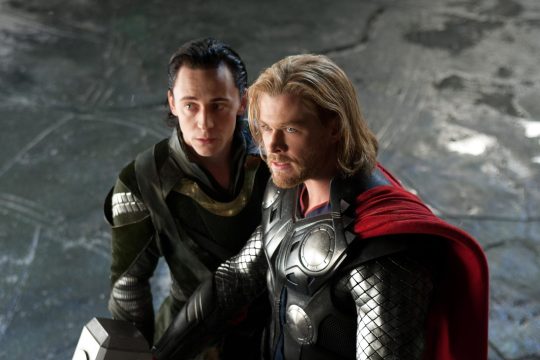
There was a lot riding on that first Thor feature. For one, no one knew if audiences would immediately latch onto a Shakespearean superhero movie partially set on an alien planet populated by the Norse Gods of legend. Second, it was integral to Feige's plans for the shared universe. Loki was supposed to be the main villain in The Avengers, which would not only mirror how Earth's mightiest heroes joined forces in 1963's Avengers #1 but also give Thor a believable reason for teaming up with Iron Man, Captain America (Chris Evans), and the rest of the capes. Feige first clued Hiddleston into those larger plans when the actor was in L.A. before Thor started shooting.
"I was like, 'Excuse me?' Because he was already three, four steps ahead," says Hiddleston. "That took me a few minutes to process, because I didn't quite realize how it just suddenly had a scope. And being cast as Loki, I realized, was a very significant moment for me in my life, and was going to remain. The creative journey was going to be so exciting."
Hiddleston relished the opportunity to go full villain in Avengers, like in the scene where Loki ordered a crowd to kneel before him outside a German opera house: "It's the unspoken truth of humanity, that you crave subjugation," says the Machiavellian god. "The bright lure of freedom diminishes your life's joy in a mad scramble for power, for identity. You were made to be ruled. In the end, you will always kneel."
"I just knew that in the structure of that film, I had to lean into his role as a pure antagonist," Hiddleston recalls. "What I always found curious and complex about the way Loki is written in Avengers, is that his status as an antagonist comes from the same well of not belonging and being marginalized and isolated in the first Thor film. Loki now knows he has no place in Asgard."
Loki did find a place within the audience's hearts, though. Feige was "all in" on Hiddleston as his Loki from the beginning, but even he couldn't predict how much fans would love him. Feige recalls the reaction at the 2013 San Diego Comic-Con: "Did we know that after he was the villain in two movies, he would be bringing thousands of people to their feet in Hall H, in costume, chanting his name? No, that was above and beyond the plan that we were hoping for and dreaming of." It was a dream Feige first got an inkling of a year earlier during the Avengers press tour when a Russian fan slipped past security, snuck into Mark Ruffalo's car, and asked the Hulk actor to give Hiddleston a piece of fan art she created. "That was one of the early signs there was much more happening with this quote-unquote villain."
Despite that popularity, the plan was to kill Loki off in 2013's Thor: The Dark World, but the studio reversed course after test audiences refused to believe he actually died fighting the Dark Elves. Alas, he couldn't out-illusion death forever. After returning in Taika Waititi's colorful and idiosyncratic Thor: Ragnarok, Hiddleston's character perished for real in the opening moments of Infinity War. In typical Loki fashion, before Thanos crushed his windpipe, he delivered a defiant speech that indicated he'd finally made peace with the anger he felt toward his family.
"It felt very, very final, and I thought, 'Okay, that's it. This is Loki's final bow and a conclusive end to the Odinson saga,'" says Hiddleston, who shot that well-earned death scene in 2017.
But, though he didn't know it yet, the actor's MCU story was far from over.
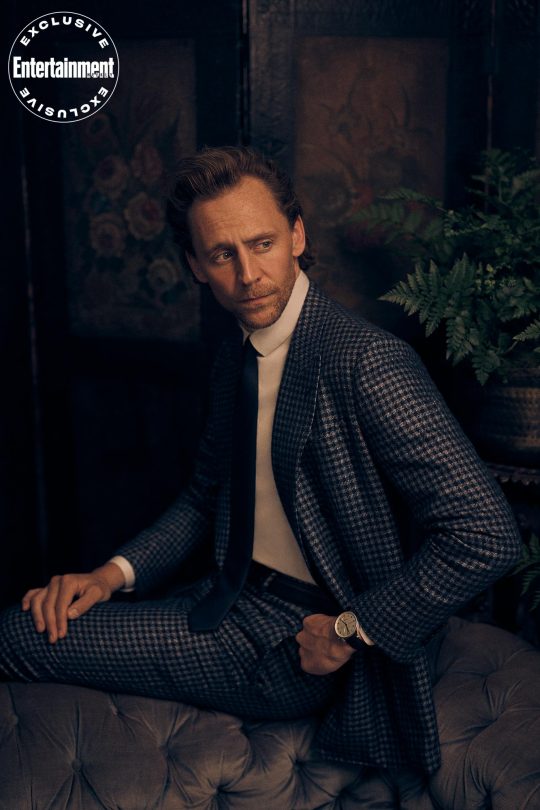
Credit: Charlie Gray for EW
When Hiddleston returned to film two scenes in Avengers: Endgame in 2017, he had no idea where Loki portaled off to after snatching the Tesseract. "Where'd he go? When does he go? How does he get there? These are all questions I remember asking on the day, and then not being given any answers," Hiddleston recalls. To be fair, it's likely the Powers That Be didn't necessarily have answers then. While Feige can't exactly recall when the writers' room for Endgame first devised Loki's escape sequence, he does know that setting up a future show wasn't the primary goal — because a Loki series wasn't on the horizon just yet.
"[That scene] was really more of a wrinkle so that one of the missions that the Avengers went on in Endgame could get screwed up and not go well, which is what required Cap and Tony to go further back in time to the '70s," says Feige. Soon after that, though, former Disney CEO Bob Iger approached Feige about producing content for the studio's forthcoming streaming service. "I think the notion that we had left this hanging loose end with Loki gave us the in for what a Loki series could be. So by the time [Endgame] came out, we did know where it was going."
As for Hiddleston, he didn't find out about the plans for a Loki show until spring 2018, a few weeks before Infinity War hit theaters. "I probably should not have been surprised, but I was," says the actor. "But only because Infinity War had felt so final."
Nevertheless, Hiddleston was excited about returning for his show. He was eager to explore Loki's powers, especially the shapeshifting, and what it meant that this disruptive figure still managed to find a seat beside the gods in mythology. "I love this idea [of] Loki's chaotic energy somehow being something we need. Even though, for all sorts of reasons, you don't know whether you can trust him. You don't know whether he's going to betray you. You don't why he's doing what he's doing," says Hiddleston. "If he's shapeshifting so often, does he even know who he is? And is he even interested in understanding who he is? Underneath all those masks, underneath the charm and the wit, which is kind of a defense anyway, does Loki have an authentic self? Is he introspective enough or brave enough to find out? I think all of those ideas are all in the series — ideas about identity, ideas about self-knowledge, self-acceptance, and the difficulty of it."
“The series will explore Loki's powers in a way they have not yet been explored, which is very, very exciting.”
The thing that truly sold Hiddleston on the show was Marvel's decision to include the Time Variance Authority, a move he describes as "the best idea that anybody had pertaining to the series." Feige and Loki executive producer Stephen Broussard had hoped to find a place for the TVA — an organization that debuted in 1986's Thor #372 and has appeared in She-Hulk and Fantastic Four stories — in the MCU for years, but the right opportunity never presented itself until Loki came along. "Putting Loki into his own procedural series became the eureka moment for the show," says Feige.
The TVA's perspective on time and reality also tied into the themes that Waldron, Loki's head writer, was hoping to explore. "Loki is a character that's always reckoning with his own identity, and the TVA, by virtue of what they do, is uniquely suited to hold up a mirror to Loki and make him really confront who he is and who he was supposed to be," says Waldron. Hiddleston adds: "[That] was very exciting because in the other films, there was always something about Loki that was very controlled. He seemed to know exactly what the cards in his hand were and how he was going to play them…. And Loki versus the TVA is Loki out of control immediately, and in an environment in which he's completely behind the pace, out of his comfort zone, destabilized, and acting out."
To truly dig into who Loki is, the creative team had to learn from the man who knows him best: Hiddleston. "I got him to do a thing called Loki School when we first started," says director Kate Herron. "I asked him to basically talk through his 10 years of the MCU — from costumes to stunts, to emotionally how he felt in each movie. It was fantastic."
Hiddleston got something out of the Loki school, too. Owen Wilson both attended the class and interviewed Hiddleston afterward so that he could better understand Loki, as his character Mobius is supposed to be an expert on him. During their conversation, Wilson pointedly asked Hiddleston what he loved about playing the character.
"And I said, 'I think it's because he has so much range,'" says Hiddleston. "I remember saying this to him: 'On the 88 keys on the piano, he can play the twinkly light keys at the top. He can keep it witty and light, and he's the God of Mischief, but he can also go down to the other side and play the heavy keys. And he can play some really profound chords down there, which are about grief and betrayal and loss and heartbreak and jealousy and pride.'" Hiddleston recalls Wilson being moved by the description: "He said, 'I think I might say that in the show.' And it was such a brilliant insight for me into how open Owen is as an artist and a performer.'"
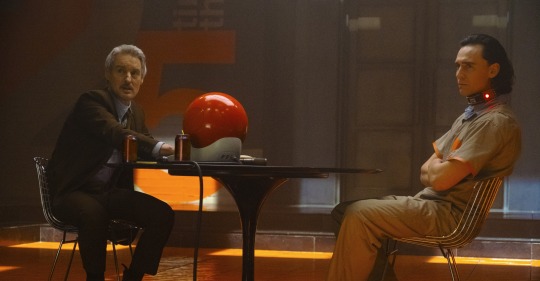
Owen Wilson as Mobius and Tom Hiddleston as Loki in 'Loki.'| Credit: Chuck Zlotnick/Marvel Studios
Everyone involved is particularly excited for audiences to see Hiddleston and Wilson's on-screen chemistry. "Mobius is not unlike Owen Wilson in that he's sort of nonplussed by the MCU," says Feige. "[Loki] is used to getting a reaction out of people, whether it's his brother or his father, or the other Avengers. He likes to be very flamboyant and theatrical. Mobius doesn't give him the reaction he's looking for. That leads to a very unique relationship that Loki's not used to."
As for the rest of the series, we know that Loki will be jumping around time and reality, but the creative team isn't keen on revealing when and where. "Every episode, we tried to take inspiration from different things," says Waldron, citing Blade Runner's noir aesthetic as one example.
"Part of the fun of the multiverse and playing with time is seeing other versions of characters, and other versions of the titular character in particular," says Feige, who also declined to confirm if Loki ties into Doctor Strange in the Multiverse of Madness and/or other upcoming projects.
Making Loki was especially meaningful to Hiddleston because they shot most of it during the pandemic, in late 2020. "It will remain one of the absolute most intense, most rewarding experiences of my life," he says. "It's a series about time, and the value of time, and what time is worth, and I suppose what the experience of being alive is worth. And I don't quite know yet, and maybe I don't have perspective on it, if all the thinking and the reflecting that we did during the lockdown ended up in the series. But in some way, it must have because everything we make is a snapshot of where we were in our lives at that time."
While it remains to be seen what the future holds for Loki beyond this initial season, Hiddleston isn't preparing to put the character to bed yet. "I'm open to everything," he says. "I have said goodbye to the character. I've said hello to the character. I said goodbye to the character [again]. I've learned not to make assumptions, I suppose. I'm just grateful that I'm still here, and there are still new roads to explore."
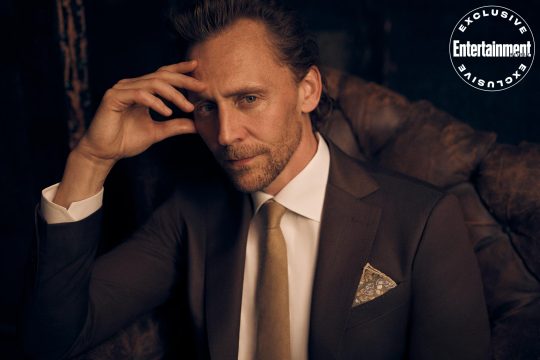
518 notes
·
View notes
Text
GQ MEXICO - PEDRO PASCAL 2021
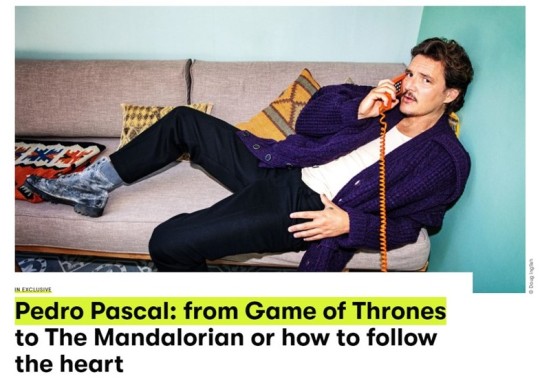

It seems that Pedro Pascal is in all possible universes. Here and there. In the past, in the present, and in galaxies far, far away. Today, the actor is considered the great entertainment reference and one of those in charge of saving a franchise that seemed lost. Enough reasons to talk exclusively about discipline, gastronomy, creeds and how he traumatized his father in 30 seconds.
The RAE defines 'creed' as the set of ideas, principles or convictions of a person or a group. For example, by creed, one can leave his country and be in exile. It happens that one can leave the loved one behind. Or simply live in another reality. And also one can put on a helmet to pretend never to take it off again. If that is the path to follow, the creed says that it must be done with the profession of faith and without stopping to look. Turning the pages of the script for The Mandalorian , the Disney + series that revived passion and nostalgia for the Star Wars franchise , Pedro Pascal came across this definition in every dialogue and moment, and reflection carved his way.
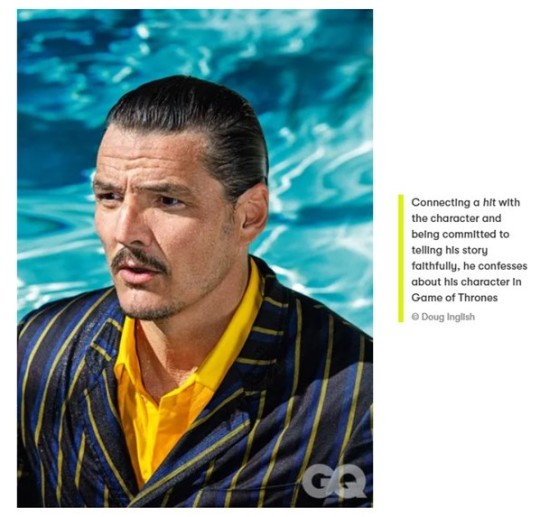
More than two decades have passed since the Chilean-American, Pedro Pascal, began his acting career and today, named as the great reference of 2020 , he misses the theater and it still hurts him not to have the discipline to exercise and maintain a diet sana while acknowledging the irony of having the best year of her career in the midst of one of the worst in recent history. But even in physical solitude, the man who carried the best-selling Christmas baby rescues many positive things and shares his vision of the universes he has traveled through, his passion for distant galaxies and how to traumatize your family with a simple scene of TV. In an interview, the Mandalorian of Latinamerica.
IMDB named you the 2020 benchmark in entertainment, a year in which the world took refuge in fiction. How was living your best time locked up and what do you rescue on a human level from it?
The strength of family relationships and friendship. For them, we endure this physical loneliness. I do find it ironic that in 2020 I received projects so well received by the public, although they were carried out before the pandemic and their impact was during it, and that year I was isolated and alone. But I must emphasize that this loneliness is a privilege when many people had to continue working, surviving and maintaining the functioning of the world. We only had to be alone, but they more than that and you must value it too.
Among the activities you have missed, how much do you miss the theater?
Much indeed. It's something that I miss the most and being with people without being afraid. See a play and return to those experiences of being with people doing and living things in common. That is what I need most, in addition to my loved ones.
Disney fully entered streaming and its strong letter has your face, what do you think of the discussion of platforms against movie theaters?
There are incredible things in streaming and many people develop great projects that they did not have access to before. The diversity of voices is gaining ground and it is important to recognize that opportunities grow exponentially and boundaries change. It is incredible the availability that we have to very well made content and how creative people can share their work in different ways. But I also want to be honest: limiting the experience of watching content only on our gadgets or at home is a mistake that affects the stories we can tell. You have to achieve a mix of opportunities and challenges.
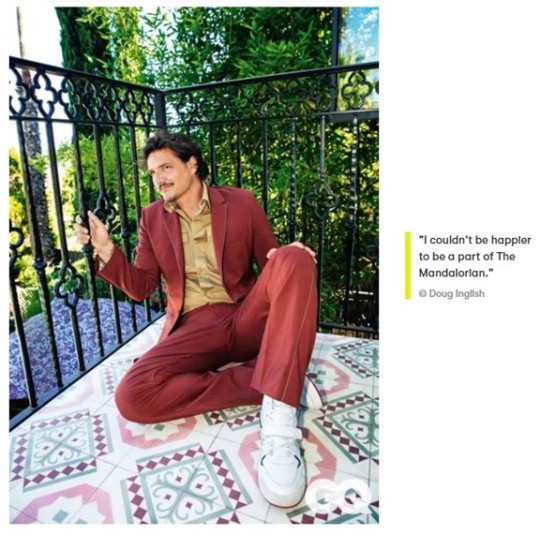
You jump between the fictional universes that mark the last decades until you reach the universe of universes. What is your first Star Wars memory and how do you summarize the essence of this legendary story?
For me, Star Wars is nostalgia itself. It is one of the primary things in my memory, of my childhood. I came to the United States with my Chilean family when I was less than two years old and one of my first memories is going to the movies with my dad to see the saga ; it becomes one of those romantic childhood things that opens your mind, so imagine how special it is to participate in this project. I think the creators of The Mandalorian perfectly understand this nostalgia and that power, and they managed to count on that element as a great ally for the world of Star Wars and I couldn't be happier to be part of it. (From which we expect the third season The Mandalorian)
The Mandalorian exploits the power and nuances of your voice, did you have that letter on your resume?
I didn't know I could do it, but I resorted to my theater preparation, which was very physical on all levels and feelings. There are elements that have to do with and that are essential to create a role, and they teach you that the voice is something primary, something you have to start with and you cannot hide. Now I have learned much more about the importance of that, and how to use it economically. The body also has to do with that, because something very subtle communicates something. In The Mandalorian , I had a great time figuring out how to do it, they gave me the opportunity to develop it in different ways. The opportunity to be very intense at it.
What happens to the ego when someone works under a suit and a mask?
In the conversations about the project, before doing it, we were communicated the idea and the concept of the entire season , so I clearly understood what it was. I wanted it to be the most powerful version of what they were trying to accomplish, so there was no point in involving my ego, you know? It was already very clear what the project meant, so I knew about the character , the piece that it represented for him and the opportunity that it was for me, so I was only focused on executing in a better way the part that touched me in everything this. In the theater, I worked several times under a mask and it helped me develop the experience.
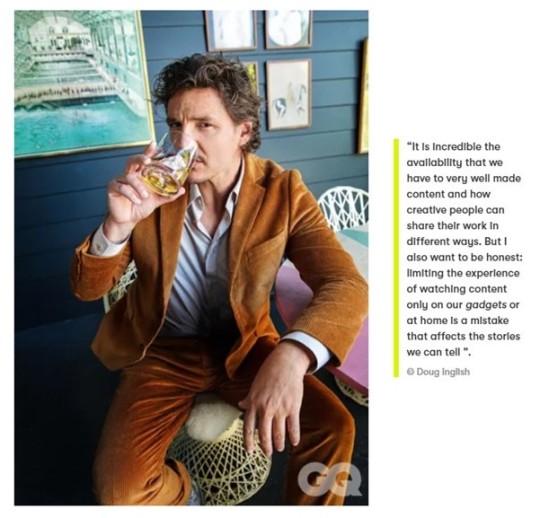
It seems that The Mandalorian has a very theatrical base ...
Exactly, and thanks to the physical experience of working in theater, doing a play a few times a week, discovering how your body and your voice communicate , being part of a whole image, and how you will tell that story visually, I achieved this character. I never imagined that it would be something I would have to use on such an important Star Wars project .
On the list of entertainment greats, there are names like Steven Spielberg and George Lucas, do you think John Favreau should be added to the list?
I think your name is already included. Without a doubt, it is in that category and it is incredible. His vision fascinates me. I remember an episode in the second season , and I had some boots and I walked so much in the snow, it stuck to them. He figured it out, so he talked to the art department about the kind of boots you need when you're out in the snow. They approached me and gave me new ones that fulfilled the idea I was looking for. He noticed it in an instant. It is such a wonderful detail and it is repeated to scale in every session with him. He thinks of absolutely everything and his vision of the use of technology is admirable. He is someone who makes you feel motivated and always sees how to achieve the goal.
One of the reflections in the series is on how and under what circumstances a man can break his creed and way of life. What makes you break with your beliefs?
I think that you must follow your heart so as not to regret anything; Although sometimes it brings pain or conflict, deep down when you look back, everything is worth it because it was what you heard in your heart. I am very afraid to deny that feeling or not to attend to it. I am 45 years old now and I cannot believe I have a finer philosophy. Make it more disciplined. It's ridiculous, but I'm trying to accept that I am and it's all I can say, "follow your heart." Although, you know, I'm not on a good diet yet, I still have trouble sleeping or exercising.
Still good at Chilean empanadas?
Yes, I couldn't stop. And also how good that I do not live in Mexico City because I would only spend it eating. I could move my whole life to defe just to eat.
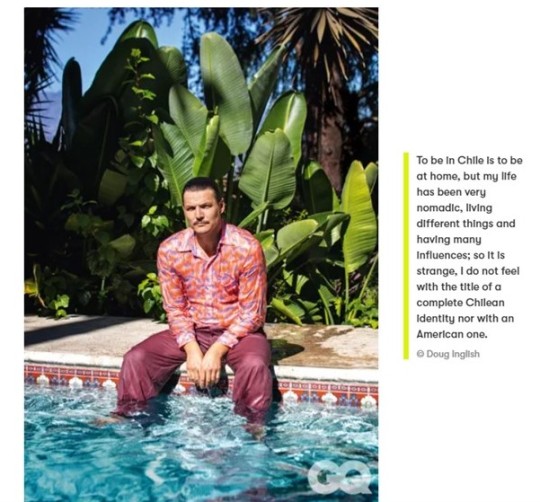
I want to deviate and ask you, with whom did you see the chapter of your death in Game of Thrones and what traumas did you cause in your family?
For me, no trauma. I separate myself well from the characters , although I fully understand that if I were a Game of Thrones audience and loved that character, it would make an incredible impression on me. Thank you that it was not. I had to interpret it and there was a model of my head to be crushed that way with the tubes and the fake blood, you know? Me lying there, with pieces of my meat, it was funny in the end. But not for my family. For them there is nothing funny but traumatic. My dad's voice changed completely when we saw the episode, he turned around and said: “I didn't like it, Pedro . No, Pedro , not this ”.
The media found similarities between your villain in Wonder Woman: 1984 and Donald Trump. When playing a character with characteristics like this, do you humanize him or do you understand him?
The project had nothing to do with the former president. They always told me that my character in Wonder Woman: 1984 was emotionally messy, and I took that and took that as far as possible. Instead of creating it with images or certain inspirations from life, it was more to work with what was on the page. Personally, what made sense to me is the size of the story that is being told and there is always more, and we all want more. Creatively, if this makes sense, that meant "blowing her out of the park." Connect a hit with the character and be committed to telling his story faithfully, in a way that was true to me. So all the exterior elements found their way.
What a way to start 2021 with the theme of the Capitol ... How do you perceive that moment?
I am not a politician and it is not that I do not have an opinion about this type of event; however, it is not necessary to state the obvious. My opinion would be very simple compared to that of a person who studied this, who knows how to act in these kinds of scenarios; I believe that I am next to the majority who experienced this, which is the logical result of what we have experienced during these years and we are all horrified . It was distressing to see this violence.
If you had the monolith in your hands, what would your wish be?
My wish would be… it's impossible, really (laughs). I think it is to be together again, with less fear and that people have the opportunity to connect.
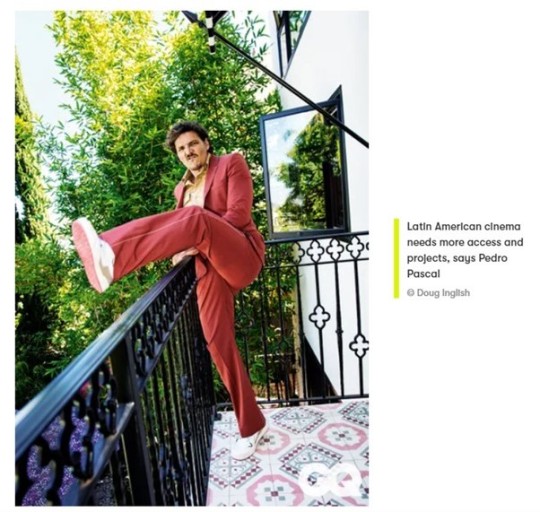
What is your position on the reality that Chile has experienced in recent years and how has the relationship with your country been since exile?
It is something that I am developing and I continue to do in my life, trying to understand that it is my home. To be in Chile is to be at home, but my life has been very nomadic, living different things and having many influences; so it is strange, I do not feel with the title of a complete Chilean identity nor with an American one.
Neither here nor there?
In a sense, but I'm also completely both. My parents are Chilean , my brothers were born there before my parents traveled, and I came back sometimes because my family is very large; in fact, my parents came back. It has always been there, it continues to develop, and it will be a part of me. I don't know if it answers your question, but it has a lot to do with who I am.
What is your relationship with Latin American cinema? Are you interested?
Much, it has invaded me in life like American cinema. The movies that I carry in my heart, seeing something like Y tu mama was also something that changed me; I also love the work that comes out of Chile , and the only thing I can say is that it is a cinema that needs more access and projects.
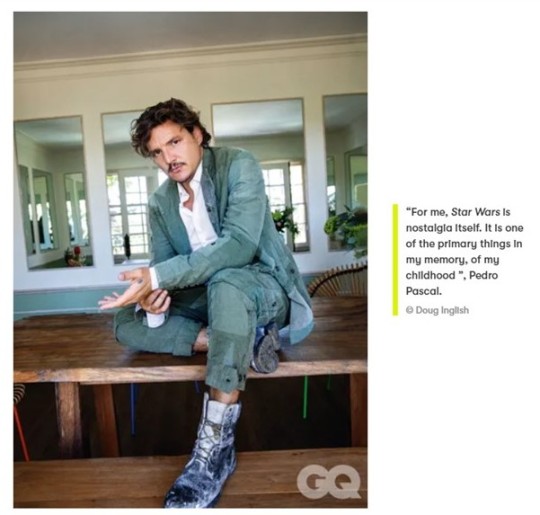
Today you have a comedy with Nicolas Cage on the door, can you tell us something?
It's my first shot at comedy , as a complete story within the genre. Speaking of American influences , in the 80s I saw all the films where Nicolas Cage appeared , he came into my life and it's great to be his partner after seeing all his performances.
How is the relationship you have with the comedy genre?
I love it, I have done a lot of comedy in the theater, what happens is that in film and television issues , I was always part of drama castings . And in the cinema, you go where the doors open; Although I identify with one or the other, I think that being an actor , one goes and does what one has to do. Comedy is something unique, it is very challenging because it must be very real to be funny, you cannot hide or use normal tricks. I was very excited to have this challenge in front of a camera.
Finally, Pedro, after going through so many fictional worlds, literally, what do you dream about when you sleep?
I dream that my bathroom is dirty, that I haven't done my math homework, that the oven is on and all that stuff. Sure, there are times when I close my eyes and see myself in all these projects , although my conscience is with the anxieties of the day that you can imagine.
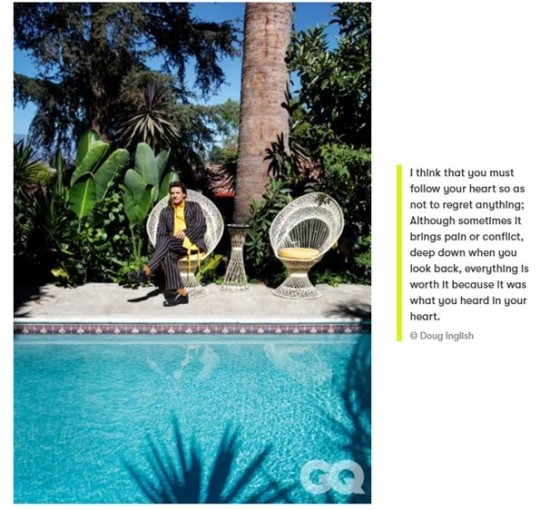
Without a doubt, Pedro Pascal is a particular type .
English Tranlation: Google Translate
SOURCE: GQ MEXICO
343 notes
·
View notes
Text
Loki takes over: Tom Hiddleston on his new TV series and a decade in the MCU
from Entertainment Weekly
Ten years after Hiddleston first chose chaos in Thor, Marvel’s fan favorite God of Mischief is going even bigger with his time-bending Disney+ show.
By Chancellor Agard May 20, 2021
Tom Hiddleston is Loki, and he is burdened with glorious purpose: After playing Thor's puckish brother for over a decade in the Marvel Cinematic Universe, no one understands the mercurial Asgardian God of Mischief as well as the actor. He can teach an entire seminar on Loki if given the opportunity — which he actually did during pre-production on his forthcoming Disney+ show. In conversation, Hiddleston quotes lines from his MCU debut, 2011's Thor, almost verbatim, and will playfully correct you if you mistakenly refer to Asgard's Rainbow Bridge as the Bifrost, which is the portal that connects Loki and Thor's homeworld to the Nine Realms, including Midgard, a.k.a. Earth. "Well, the Bifrost technically is the energy that runs through the bridge," he says with a smile. "But nine points to Gryffindor!" And when he shows up to the photo shoot for this very digital cover, he hops on a call with our photo editor to pitch ways the concept could be even more Loki, like incorporating the flourish the trickster does whenever magically conjuring something. The lasting impression is that playing Loki isn't just a paycheck.
"Rather than ownership, it's a sense of responsibility I feel to give my best every time and do the best I can because I feel so grateful to be a part of what Marvel Studios has created," the 40-year-old Brit tells EW over Zoom a few days after the shoot and a week out from Thor's 10th anniversary. "I just want to make sure I've honored that responsibility with the best that I can give and the most care and thought and energy."
After appearing in three Thor movies and three Avengers, Hiddleston is bringing that passion to his first solo Marvel project, Loki, the House of Ideas' third Disney+ series following the sitcom pastiche WandaVision and the topical The Falcon and the Winter Soldier. Led by head writer Michael Waldron (Doctor Strange in the Multiverse of Madness, Heels), the six-episode drama sees Hiddleston's shapeshifting agent of chaos step out from behind his brother's shadow and into the spotlight for a timey-wimey, sci-fi adventure that aims to get to the bottom of who Loki really is. "I wanted to explore slightly more complex character questions," says Waldron. "It's not just good versus bad. Is anybody all good? Is anybody all bad? What makes a hero, a hero? A villain, a villain?"
Even though Loki — who loves sowing mayhem with his illusion magic and shapeshifting, all with a major chip on his shoulder — has never been one for introspection, the idea of building an entire show around him was a no-brainer for Marvel. When asked why Loki was one of the studio's first Disney+ shows, Marvel president Kevin Feige replies matter-of-factly, "More Hiddleston, more Loki." First introduced as Thor's (Chris Hemsworth) envious brother in Kenneth Branagh's Thor, Loki went full Big Bad in 2012's The Avengers. That film cemented the impish rogue as one of the shared universe's fan favorites, thanks to Hiddleston's ability to make him deliciously villainous yet charismatic and, most importantly, empathetic. The character's popularity is one of the reasons he's managed to avoid death many times.
"He's been around for thousands of years. He had all sorts of adventures," says Feige. "Wanting to fill in the blanks and see much more of Loki's story [was] the initial desire [for the series]."
The Loki we meet on the show is not the one who fought the Avengers in 2012 and evolved into an antihero in Thor: The Dark World and Thor: Ragnarok before meeting his demise at the hands of the mad titan Thanos (Josh Brolin) in 2018's Avengers: Infinity War. Instead, we'll be following a Loki from a branched timeline (a variant, if you will) after he stole the Tesseract following his thwarted New York invasion and escaped S.H.I.E.L.D. custody during the time heist featured in Avengers: Endgame. In other words, this Loki hasn't gone through any sort of redemption arc. He's still the charming yet petulant god who firmly believes he's destined to rule and has never gotten his due.
Premiering June 9, Loki begins with the Time Variance Authority — a bureaucratic organization tasked with safeguarding the proper flow of time — arresting the Loki Variant seen in Endgame because they want his help fixing all of the timeline problems he caused while on the run with the Tesseract. So there will be time travel, and a lot more of it than in Endgame. As Loki makes his way through his own procedural, he'll match wits with new characters including Owen Wilson's Agent Mobius, a brilliant TVA analyst, and Gugu Mbatha-Raw's Judge Renslayer. The question in early episodes is whether Loki will help them or take over.
"One of the things Kevin Feige led on was, 'I think we should find a way of exploring the parts of Loki that are independent of his relationship with Thor,' or see him in a duality or in relationship with others, which I thought was very exciting," says Hiddleston, who also serves as an executive producer on the show. "So the Odinson saga, that trilogy of films, still has its integrity, and we don't have to reopen it and retell it."
Yet, in order to understand where Loki is going, it's important to see where he came from.
Hiddleston can't believe how long he and Loki have been connected. "I've been playing this character for 11 years," he says. "Which is the first time I have said that sentence, I realize, and it [blows] my mind. I don't know what percentage that is exactly of my 40 years of being alive, but it's substantial."
His time as Loki actually goes a bit further back, to 2009 — a year after Robert Downey Jr. big banged the MCU into existence with Iron Man — when he auditioned for Thor. It's no secret that Hiddleston initially went in for the role of the titular God of Thunder, but Feige and director Kenneth Branagh thought his natural charm and flexibility as an actor made him better suited for the movie's damaged antagonist. "Tom gave you an impression that he could be ready for anything, performance-wise," says Branagh, who had previously worked with him on a West End revival of Checkov's Ivanov and the BBC series Wallander. "Tom has a wild imagination, so does Loki. He's got a mischievous sense of humor and he was ready to play. It felt like he had a star personality, but he was a team player."
Hiddleston fully immersed himself in the character. Outside of studying Loki's history in the Marvel Comics, he also researched how Loki and the Trickster God archetype appeared across mythology and different cultures. "He understood that he was already in something special [and] it was a special character in a special part of that early moment in the life of the Marvel universe where [he] also needed to step up in other ways," says Branagh, who was impressed by the emotional depth Hiddleston brought to the part, especially when it came to how isolated Loki felt in the Asgardian royal family.
There was a lot riding on that first Thor feature. For one, no one knew if audiences would immediately latch onto a Shakespearean superhero movie partially set on an alien planet populated by the Norse Gods of legend. Second, it was integral to Feige's plans for the shared universe. Loki was supposed to be the main villain in The Avengers, which would not only mirror how Earth's mightiest heroes joined forces in 1963's Avengers #1 but also give Thor a believable reason for teaming up with Iron Man, Captain America (Chris Evans), and the rest of the capes. Feige first clued Hiddleston into those larger plans when the actor was in L.A. before Thor started shooting.
"I was like, 'Excuse me?' Because he was already three, four steps ahead," says Hiddleston. "That took me a few minutes to process, because I didn't quite realize how it just suddenly had a scope. And being cast as Loki, I realized, was a very significant moment for me in my life, and was going to remain. The creative journey was going to be so exciting."
Hiddleston relished the opportunity to go full villain in Avengers, like in the scene where Loki ordered a crowd to kneel before him outside a German opera house: "It's the unspoken truth of humanity, that you crave subjugation," says the Machiavellian god. "The bright lure of freedom diminishes your life's joy in a mad scramble for power, for identity. You were made to be ruled. In the end, you will always kneel."
"I just knew that in the structure of that film, I had to lean into his role as a pure antagonist," Hiddleston recalls. "What I always found curious and complex about the way Loki is written in Avengers, is that his status as an antagonist comes from the same well of not belonging and being marginalized and isolated in the first Thor film. Loki now knows he has no place in Asgard."
Loki did find a place within the audience's hearts, though. Feige was "all in" on Hiddleston as his Loki from the beginning, but even he couldn't predict how much fans would love him. Feige recalls the reaction at the 2013 San Diego Comic-Con: "Did we know that after he was the villain in two movies, he would be bringing thousands of people to their feet in Hall H, in costume, chanting his name? No, that was above and beyond the plan that we were hoping for and dreaming of." It was a dream Feige first got an inkling of a year earlier during the Avengers press tour when a Russian fan slipped past security, snuck into Mark Ruffalo's car, and asked the Hulk actor to give Hiddleston a piece of fan art she created. "That was one of the early signs there was much more happening with this quote-unquote villain."
Despite that popularity, the plan was to kill Loki off in 2013's Thor: The Dark World, but the studio reversed course after test audiences refused to believe he actually died fighting the Dark Elves. Alas, he couldn't out-illusion death forever. After returning in Taika Waititi's colorful and idiosyncratic Thor: Ragnarok, Hiddleston's character perished for real in the opening moments of Infinity War. In typical Loki fashion, before Thanos crushed his windpipe, he delivered a defiant speech that indicated he'd finally made peace with the anger he felt toward his family.
"It felt very, very final, and I thought, 'Okay, that's it. This is Loki's final bow and a conclusive end to the Odinson saga,'" says Hiddleston, who shot that well-earned death scene in 2017.
But, though he didn't know it yet, the actor's MCU story was far from over.
When Hiddleston returned to film two scenes in Avengers: Endgame in 2017, he had no idea where Loki portaled off to after snatching the Tesseract. "Where'd he go? When does he go? How does he get there? These are all questions I remember asking on the day, and then not being given any answers," Hiddleston recalls. To be fair, it's likely the Powers That Be didn't necessarily have answers then. While Feige can't exactly recall when the writers' room for Endgame first devised Loki's escape sequence, he does know that setting up a future show wasn't the primary goal — because a Loki series wasn't on the horizon just yet.
"[That scene] was really more of a wrinkle so that one of the missions that the Avengers went on in Endgame could get screwed up and not go well, which is what required Cap and Tony to go further back in time to the '70s," says Feige. Soon after that, though, former Disney CEO Bob Iger approached Feige about producing content for the studio's forthcoming streaming service. "I think the notion that we had left this hanging loose end with Loki gave us the in for what a Loki series could be. So by the time [Endgame] came out, we did know where it was going."
As for Hiddleston, he didn't find out about the plans for a Loki show until spring 2018, a few weeks before Infinity War hit theaters. "I probably should not have been surprised, but I was," says the actor. "But only because Infinity War had felt so final."
Nevertheless, Hiddleston was excited about returning for his show. He was eager to explore Loki's powers, especially the shapeshifting, and what it meant that this disruptive figure still managed to find a seat beside the gods in mythology. "I love this idea [of] Loki's chaotic energy somehow being something we need. Even though, for all sorts of reasons, you don't know whether you can trust him. You don't know whether he's going to betray you. You don't why he's doing what he's doing," says Hiddleston. "If he's shapeshifting so often, does he even know who he is? And is he even interested in understanding who he is? Underneath all those masks, underneath the charm and the wit, which is kind of a defense anyway, does Loki have an authentic self? Is he introspective enough or brave enough to find out? I think all of those ideas are all in the series — ideas about identity, ideas about self-knowledge, self-acceptance, and the difficulty of it."
“The series will explore Loki's powers in a way they have not yet been explored, which is very, very exciting.”
The thing that truly sold Hiddleston on the show was Marvel's decision to include the Time Variance Authority, a move he describes as "the best idea that anybody had pertaining to the series." Feige and Loki executive producer Stephen Broussard had hoped to find a place for the TVA — an organization that debuted in 1986's Thor #372 and has appeared in She-Hulk and Fantastic Four stories — in the MCU for years, but the right opportunity never presented itself until Loki came along. "Putting Loki into his own procedural series became the eureka moment for the show," says Feige.
The TVA's perspective on time and reality also tied into the themes that Waldron, Loki's head writer, was hoping to explore. "Loki is a character that's always reckoning with his own identity, and the TVA, by virtue of what they do, is uniquely suited to hold up a mirror to Loki and make him really confront who he is and who he was supposed to be," says Waldron. Hiddleston adds: "[That] was very exciting because in the other films, there was always something about Loki that was very controlled. He seemed to know exactly what the cards in his hand were and how he was going to play them…. And Loki versus the TVA is Loki out of control immediately, and in an environment in which he's completely behind the pace, out of his comfort zone, destabilized, and acting out."
To truly dig into who Loki is, the creative team had to learn from the man who knows him best: Hiddleston. "I got him to do a thing called Loki School when we first started," says director Kate Herron. "I asked him to basically talk through his 10 years of the MCU — from costumes to stunts, to emotionally how he felt in each movie. It was fantastic."
Hiddleston got something out of the Loki school, too. Owen Wilson both attended the class and interviewed Hiddleston afterward so that he could better understand Loki, as his character Mobius is supposed to be an expert on him. During their conversation, Wilson pointedly asked Hiddleston what he loved about playing the character.
"And I said, 'I think it's because he has so much range,'" says Hiddleston. "I remember saying this to him: 'On the 88 keys on the piano, he can play the twinkly light keys at the top. He can keep it witty and light, and he's the God of Mischief, but he can also go down to the other side and play the heavy keys. And he can play some really profound chords down there, which are about grief and betrayal and loss and heartbreak and jealousy and pride.'" Hiddleston recalls Wilson being moved by the description: "He said, 'I think I might say that in the show.' And it was such a brilliant insight for me into how open Owen is as an artist and a performer.'"
Everyone involved is particularly excited for audiences to see Hiddleston and Wilson's on-screen chemistry. "Mobius is not unlike Owen Wilson in that he's sort of nonplussed by the MCU," says Feige. "[Loki] is used to getting a reaction out of people, whether it's his brother or his father, or the other Avengers. He likes to be very flamboyant and theatrical. Mobius doesn't give him the reaction he's looking for. That leads to a very unique relationship that Loki's not used to."
As for the rest of the series, we know that Loki will be jumping around time and reality, but the creative team isn't keen on revealing when and where. "Every episode, we tried to take inspiration from different things," says Waldron, citing Blade Runner's noir aesthetic as one example.
"Part of the fun of the multiverse and playing with time is seeing other versions of characters, and other versions of the titular character in particular," says Feige, who also declined to confirm if Loki ties into Doctor Strange in the Multiverse of Madness and/or other upcoming projects.
Making Loki was especially meaningful to Hiddleston because they shot most of it during the pandemic, in late 2020. "It will remain one of the absolute most intense, most rewarding experiences of my life," he says. "It's a series about time, and the value of time, and what time is worth, and I suppose what the experience of being alive is worth. And I don't quite know yet, and maybe I don't have perspective on it, if all the thinking and the reflecting that we did during the lockdown ended up in the series. But in some way, it must have because everything we make is a snapshot of where we were in our lives at that time."
While it remains to be seen what the future holds for Loki beyond this initial season, Hiddleston isn't preparing to put the character to bed yet. "I'm open to everything," he says. "I have said goodbye to the character. I've said hello to the character. I said goodbye to the character [again]. I've learned not to make assumptions, I suppose. I'm just grateful that I'm still here, and there are still new roads to explore."
Additional reporting by Jessica Derschowitz
26 notes
·
View notes
Text
my new revamped story for my old gw2 oc kipp makes me so happy, I'm so glad I dont have to entirely abandon characters and story concepts that I really liked and can repurpose them for my own enjoyment... I want to collect what I have so far. On mobile so no cut, sorry. It takes some big liberties with lore but it's just for myself so I think it's ok...
kipp is a genius inventor. he won the snaff's prize and recently graduated from the college of synergenics with highest of honors. he's renowned in rata sum for his breakthrough research in the application of the arcane arts to technology. he's basically an asuran rock star.
he also hates actually inventing and researching. he finds it painful and tedious and difficult. he's like a brilliant writer who hates the process of writing. he loves having invented; that was what people gave you money and attention and free beer for. he loves that part. but actually inventing? he puts it off as much as he can.
Kipp is also deeply unstable. he has mercurial moods and crippling anxiety. he suffers from debilitatingly bad racing thoughts. he often teeters into the realm of suicidal. he's an asuran rock star in more ways than one. he's an egotist who considers himself the Alchemy's gift to tyria; he hates himself and is just waiting for his own inevitable crash and burn. He has issues.
this is the part that i am still figuring out. an actual plot in the gw2 universe and not just a personality and backstory. most of it is repurposed ideas from an old au story with someone i don't talk to anymore and tacked onto an asura necro i already had in-game.
so. kipp gets courted by the Inquest, of course, because of his accolades and big reputation. he finds them somewhat distasteful, but they offer him such a good grant that he comes by one of their bases to consider taking the job. there he meets inquisitor mila.
mila is a high-ranking inquest scientist undertaking radical research into reviving the dead. they're an ambitious genius with no regard for anything but their own goals. kipp's potential caught their eye and they wanted him in their krewe at all costs. they manipulate him into working with the Inquest despite his moral reservations. mila way overworks him and keeps him under their control by manipulating his already unstable emotions. Half honeyed praise, half cruel, cutting needling. mila keeps him working day and night on their research. Every time kipp starts to show too much doubt, they play to his ego: "We're going to conquer death itself, kid! We'll be the Krewe that figures out resurrection once and for all. It will be the greatest invention since fire!"
For their part, Mila is becoming more and more convinced that Kipp is a necessary key to their research's success. they are cruel and manipulative to him on the outside, but on the inside, they adore him. they find him delightful in a way no one else has ever really been. they spent most of their life detached and feigning interest in anything that wasn't the science of the dead. kipp was so clever. he was their equal in brilliance. his flaws were funny and his quirks charming. They loved to be cruel to him to see how it would rile him up. to manipulate him like playing the violin, one of their few other passions. he was like an experiment, interesting and he was exciting in the way that only their work had been before now.
but eventually mila goes too far with their experiments and kipp has enough! Mila tries to hurt too many innocent people. Kipp has such a bad breakdown that it finally pushes him into quitting. mila straight up won't allow him to. They say they'll keep him on the krewe by force if that's what it takes. "There's no takebacks with the Inquest, Kipp. Did you think we'd let a mind as valuable as yours just walk away?"
Kipp threatens to destroy all their work. On a suicidal, foolhardy impulse, he turns on the invention they'd been working on, a resurrection machine. He tries to overload it and explode it. It works, killing both Kipp and Mila in the blast.
But, it's a resurrection machine. Their spirits don't go to the Mists. They're tethered to their earthly bodies. Kipp, an elementalist in his training, isn't fully conscious, neither his dead/dying body or his spirit. Mila, a much older and more experienced necromancer, is.
They use their magic to make a choice. They expend the rest of their life force to force the life back into Kipp's body. They bring him back from the dead, but they kill their chance at coming back in the process. only their power as a very experienced necromancer keeps them from being ripped from the mortal world and into the mist.
Their soul is bound to kipp's. Now they're a ghost that haunts him, constantly manipulating him inside his head.
I'm not sure where it goes after that. But I am enjoying my new/revamped set of fucked up toys
3 notes
·
View notes
Text
Anime i’ve Watched
That begin with a S (Part 3)!
Yep this is how i’m going to bring over all the anime and manga i’ve watched and posted about on the old blog. It’s not so detailed but it will have to do. Anything new I watch or read from this point on will have their own posts.
Shinsekai yori (From the New World):
Genres: Drama, Horror, Mystery, Psychological, Sci-fi, SUpernatural
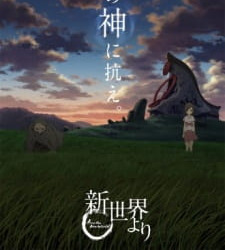
Synopsis: In the town of Kamisu 66, 12-year-old Saki Watanabe has just awakened to her psychic powers and is relieved to rejoin her friends—the mischievous Satoru Asahina, the shy Mamoru Itou, the cheerful Maria Akizuki, and Shun Aonuma, a mysterious boy whom Saki admires—at Sage Academy, a special school for psychics. However, unease looms as Saki begins to question the fate of those unable to awaken to their powers, and the children begin to get involved with secretive matters such as the rumored Tainted Cats said to abduct children. Shinsekai yori tells the unique coming-of-age story of Saki and her friends as they journey to grow into their roles in the supposed utopia. Accepting these roles, however, might not come easy when faced with the dark and shocking truths of society, and the impending havoc born from the new world. [Written by MAL Rewrite]
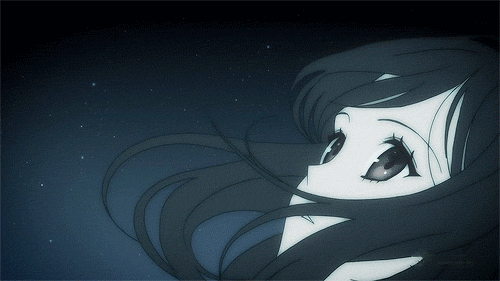
My Rating: 8/10
Finished airing in 2013 with a total of 25 episodes.
MY Thoughts: What a wild concept and execution. I feel like some bits were executed a bit poor but overall it’s an interesting anime worth at least a single watch in my opinion.
Shisha no Teikoku (The Empire of Corpses):
Genres: Film, Sci-fi, Historical, Psychological
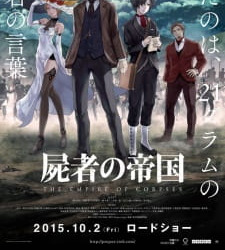
Synopsis: By the 19th century, humanity has cultivated technology enabling the reanimation of corpses. Unable to experience individual thoughts or emotions, the corpses are programmed by humans to act as laborers in various occupations. This newfound technology, however, comes with a catch. Science may be able to restore the corpses' ability to move, yet it cannot return what every corpse loses at death: the soul. But Doctor Victor Frankenstein, who vanished shortly after his revolutionary work on corpse reanimation, is said to have revived the only corpse in possession of a soul. In pursuit of this scientific knowledge, London medical student John Watson hopes to fulfill his promise to his late partner, Friday. After being scouted by a government agency, Watson is on a hunt to obtain Frankenstein's notes, which he believes hold the key to the secrets of the soul. During his search, Watson uncovers the harsh realities of the developing corpse technology and the price he must pay to advance his research. [Written by MAL Rewrite]

My Rating: 5/10
A film released in 2015.
My Thoughts: Very clear Frankenstein influence. Pretty bleh. Nothing great. Not worth a watch.
Shouwa Genroku Rakugo Shinjuu:
Genres: Drama, Historical, Josei

Synopsis: Yotarou is a former yakuza member fresh out of prison and fixated on just one thing: rather than return to a life of crime, the young man aspires to take to the stage of Rakugo, a traditional Japanese form of comedic storytelling. Inspired during his incarceration by the performance of distinguished practitioner Yakumo Yuurakutei, he sets his mind on meeting the man who changed his life. After hearing Yotarou's desperate appeal for his mentorship, Yakumo is left with no choice but to accept his very first apprentice. As he eagerly begins his training, Yotarou meets Konatsu, an abrasive young woman who has been under Yakumo's care ever since her beloved father Sukeroku Yuurakutei, another prolific Rakugo performer, passed away. Through her hidden passion, Yotarou is drawn to Sukeroku's unique style of Rakugo despite learning under contrasting techniques. Upon seeing this, old memories and feelings return to Yakumo who reminisces about a much earlier time when he made a promise with his greatest rival. Shouwa Genroku Rakugo Shinjuu is a story set in both the past and present, depicting the art of Rakugo, the relationships it creates, and the lives and hearts of those dedicated to keeping the unique form of storytelling alive. [Written by MAL Rewrite]

My Rating: 10/10
Finished airing in 2016 with a total of 13 episodes.
My Thoughts: A masterpiece, one of my favourite animes to date and it even has a sequel! Great artwork, music, story and characters. A very interesting experience. That being said... it may not be an anime for everyone but if it interests you I highly recommend this particular title!
Shouwa Genroku Rakugo Shinjuu: Sukeroku Futatabi-hen:
Genres: Drama, Historical, Josei

Synopsis: Even after having risen to the utmost rank of shun'ichi, Yotaro struggles to find his own identity in the world of rakugo. Caught between his master's teachings and the late Sukeroku's unique style, his performance lacks an important ingredient—ego. And while his popularity packs the theaters, he is but one of the few; rakugo is under threat of being eclipsed. Meanwhile Yakumo, regarded by many as the last bastion of preserving the popularity of rakugo, struggles to cope with his elderly state. Even though his performances are still stellar, he fears that he is nearing his limits. His doubts grow stronger as an old friend creeps ever closer. Konatsu, for her part, attempts to raise her son as a single mother, which Yotaro is heavily opposed to. Instead, he seeks to persuade her to marry him and in turn raise her son as his own. In Shouwa Genroku Rakugo Shinjuu: Sukeroku Futatabi-hen, the curtains fall on Yotaro and Yakumo's story, tasked with restoring the near-obsolete art form as well as overcoming their internal conflicts. [Written by MAL Rewrite]
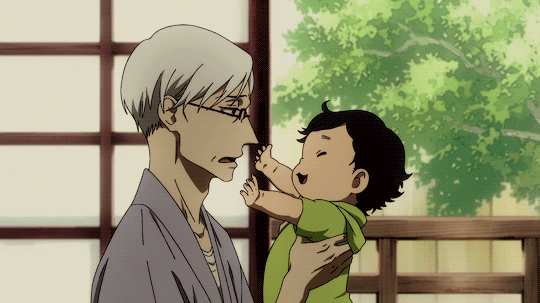
My Rating: 10/10
Finished airing in 2017 with a total of 12 episodes.
My Thoughts: Just as good, if not better than the first season. A perfect ending to a perfect story.
Skip Beat!:
Genres: Comedy. Romance, Drama, Shoujo

Synopsis: Bright, diligent, and yet naïve 16-year-old Kyouko Mogami works hard to support the career and dreams of her childhood friend, crush, and rising pop icon, Shoutarou Fuwa. Toiling endlessly at burger joints and tea ceremonies, the innocent Kyouko remains unaware that day in day out, all her tireless efforts have been taken for granted, until, one day, she finds out that her beloved Shou sees her as nothing but a free servant. Shocked, heartbroken and enraged, she vows to take revenge on the rookie star by entering the ruthless world of entertainment herself. As she steps into this new life, Kyouko will face new challenges as well as people who will push her out of her comfort zone. Based on the best-selling shoujo manga by Yoshiki Nakamura, Skip Beat showcases the growth of a young woman who slowly unlearns how to work herself to the bone for the satisfaction of others and takes her future into her own hands instead. [Written by MAL Rewrite]

My Rating: 7/10
Finished airing in 2009 with a total of 25 episodes.
My Thoughts: I do not love the artwork... but that can be easily overlooked. Honestly I can’t remember all that much about this particular anime. I do know that it has a manga which is much further along than the anime.... so maybe you should check that out first if you’re interested and watch the anime as extra after?
#shinsekai yori#from the new world#anime#past anime#the empire of corpses#shisha no teikoku#films#shouwa genroku rakugo shinjuu
23 notes
·
View notes
Text
Whenever I discuss Sleeping Beauty with someone who doesn’t share my enthusiasm for Disney, they have an irksome tendency to get it muddled with Snow White; their excuse being “it has the same plot”. I’ll admit, there are some surface similarities that even the most casual viewer can pick up on: a fairytale where a princess is forced into unconsciousness and wakes up with some necking, the comic relief and villain being the most beloved characters, a little frolic in the forest with animals, the antagonist plunging off a cliff, you get the idea. In fact, Sleeping Beauty even reuses some discarded story beats from Snow White, mainly our couple dancing on a cloud and the villain capturing the prince to prevent him from waking his princess. Yet despite that, Snow White and Sleeping Beauty are two wholly different movies shaped by the era and talents of the time.
I’ve discussed how Walt Disney was never one to stick to a repeated formula, no matter how successful it was. He must have noticed the parallels between his first movie and this one, but decided to make one crucial change for Sleeping Beauty that would forever differentiate the two: the look. We all know the traditional Disney house style: round, soft shapes, big eyes; charming as it was and still is, Walt was sick of it after several decades. Meanwhile, artists like Mary Blair and Eyvind Earle were producing gorgeous concept art that rarely made a perfect translation into the Disney house style.
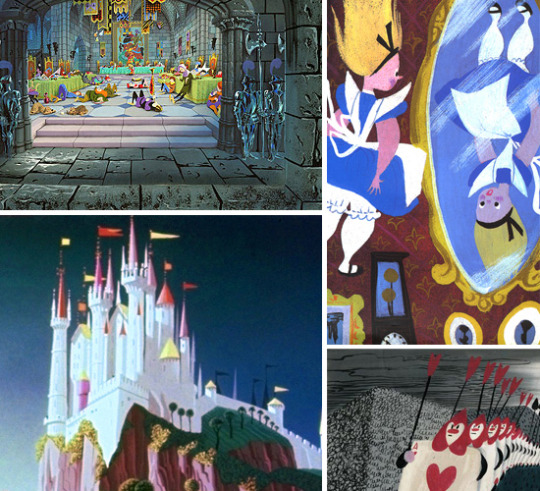
Walt wanted to make a feature that took the pop artistry of their designs and made the animation work for it instead of the other way around – which brings us to another animation studio that was doing well at the time, United Pictures Animation, or UPA.
UPA didn’t have the kind of budget Disney normally had for their animated projects, but what they lacked in fluidity they made up for in style. Watch The Tell-Tale Heart, Gerald McBoing-Boing and Rooty-Toot-Toot to see what I mean. UPA were pioneers of limited animation, taking their scant resources and creating some striking visuals with bold geometric designs. Through this, they defined the look of 50’s animation. Though perhaps unintentional, Sleeping Beauty comes across as Disney’s response to UPA, or what would happen if UPA had the funds they deserved. The characters’ contours are angular but effortlessly graceful, defining their inherent dignity and royalty. And the colors, ohhh the colors…
Because of the immense amount of work required to animate in this difficult new style (and in the Cinemascope ratio, no less) as well as story troubles and Walt barely supervising the animation studio now that he had his hands full with live-action films, television, and a theme park, Sleeping Beauty had a turbulent production that lasted the entirety of the 1950s. For a time, Chuck Jones of Looney Tunes fame was set to direct. Director Wilfred Jackson suffered a heart attack partway through production and Eric Larson, one of the Nine Old Men, took the mantle from there before Walt Disney replaced him Clyde Geronimi. And even after that, Wolfgang Reitherman teamed up with Geronimi as co-director to get the film finished after no less than three delays. Also, Don Bluth got his foot in the door as an assistant animator for this feature, beginning his short-lived but impactful tenure at Disney. Did all this hamper the movie, or did they succeed in what they set out to accomplish?
Well, one of the reasons why this review took so long was because I had a hard time not repeating “MOVIE PRETTY” and “MALEFICENT AWESOME” over and over. Make what you will of that.
The story begins as most fairy tales do with your typical king, Stefan, and his queen suddenly blessed with a baby girl after years of wishing for a child. They christen their daughter Aurora (middle name Borealis, localized entirely within their castle) and throw a huge celebration in her honor. People come from all over the kingdom to pay homage to the princess and OSMKFKSBFHFGILWBHBFC…
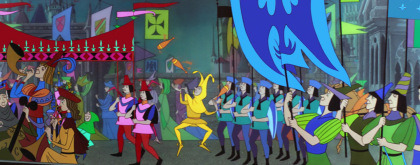
Movie pretty…
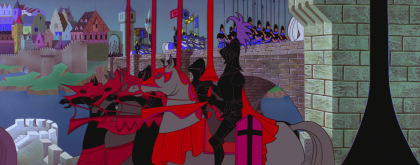
Movie pretty…
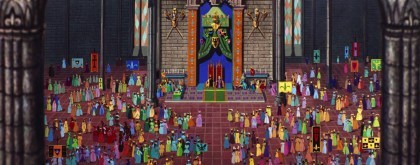
MOVIE PRETTIEEEEEE…
John Hench, Academy Award-winning special effects man and art director, turned Walt on to the idea of basing the look of Sleeping Beauty on classic medieval artwork. Thanks to him and Eyvind Earle’s insanely detailed designs and backgrounds, this is one of Disney’s most visually distinct and beautiful films. A single still from this feature wouldn’t feel out of place up in The Cloisters.
Among the party guests is King Stefan’s old friend King Hubert (Bill Thompson) bringing his young son Prince Philip. Stefan and Hubert wish to unite their two kingdoms and formally announce Philip’s betrothal to the infant Aurora.
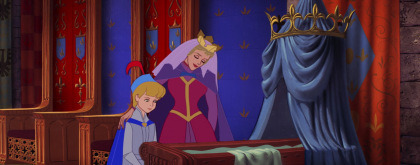
“We were going to do it during the second trimester, but we decided to wait until she was more mature.”
By the way, your eyes are not deceiving you. That is Aurora’s mother, Queen Leah, alive and well and named. And frabjous day calloo callay, she even gets some lines! The most common joke about Disney princesses is that they don’t have moms (even Ralph Breaks The Internet went out of its way to highlight that), so as a hardcore Disney fan who often has to put up with this generalization, Leah’s existence leaves me feeling vindicated.
Once that happy revelation is out of the way, we’re introduced to our main protagonists.
Oh, you thought I was referring to Philip and Aurora? Nonononono, my friends. THESE are the true heroes of Sleeping Beauty, the Three Good Fairies.
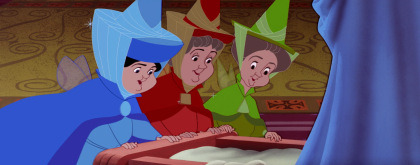
The fairies started off as one-note side characters sharing the same personality. Think pre-Ducktales-reboot Huey, Dewey, and Louie in dresses. But the studio had a difficult time giving Aurora more depth and was having a lot more fun developing the fairies. Naturally, they became so fascinating and appealing that more screentime was given over to them. Now the story’s carried by three wonderfully fleshed out ladies who are distinct in both looks and personality: Flora’s the pragmatic tradition-adhering leader, Fauna’s the sweet scatterbrain who mediates, and Merryweather’s the feisty young upstart.
With the plot now focused on characters who held a traditionally minor role, it’s easy to read this as a perspective-flipped version of the fairytale, but there’s more to it than that. Remember in my Clash of the Titans review how I mentioned the gods literally play chess using the heroes as pieces? I tend to view the main conflict of Sleeping Beauty in the same way. The Three Fairies and Maleficent are in a constant game of good vs. evil, moving Aurora, Philip, and the rest of the royals as pawns in their plans. There’s plenty of plotting and intrigue, with both sides constantly guessing and second-guessing the other’s next maneuver, and even if you’re already familiar with the story’s trajectory you’re still left on the edge of your seat as it inches towards the fiery climax.
And dare I say it but…the fairies and their power dynamic make this Disney’s most feminist film. Yes, really. You could argue that some of the other animated movies from the Renaissance and Revival period have more notable, stronger female protagonists, and many of the live-action remakes try to be woke without really grasping the concept, but consider this: The cast of Sleeping Beauty is mostly female, the leads aren’t objectified in any manner (that is if you count Aurora as a supporting character), nor does their gender factor into their competency, each one differs in age and body type, and most of them are working together towards a common goal as opposed to against each other. Name a movie in the past decade that does the same and still manages to be entertaining (no, really, I’d love to see it). There’s even one scene that unintentionally provides great commentary on the divides in the feminist movement, but more on that later.
Flora and Fauna bless the baby with beauty and song respectively which are accompanied by a short chorus and some sumptuous graphics. I don’t think I need to reiterate that when this movie goes extra with the visuals, it GOES EXTRA with the visuals. Next comes Merryweather with her gift. To this day, no one knows what Merryweather intended to give Aurora. Flora’s the most traditionally feminine of the three so her giving Aurora beauty comes as no surprise. By comparison, Merryweather is the most forward (or unconventional, depending on your point of view). I wouldn’t put it past her to favor Aurora with intelligence, or humor, or passion, or creativity or humility or confidence or decisiveness or physical fitness or great swordsmanship or telekinesis or ice powers or one million YouTube subscribers or comfort in her female sexuality.
Me personally, I think I’ve got the best gift of all:
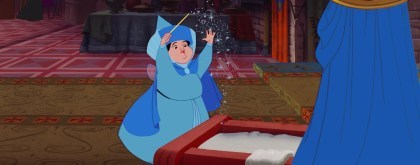
“O Princess, my gift shall be…getting all reviews posted on time for once!”
Alas, before Merryweather can bestow such a wondrous quality upon the child, she’s interrupted by a horny party crasher.
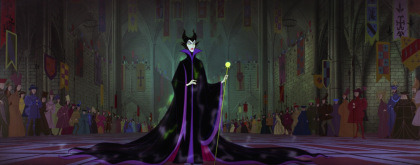
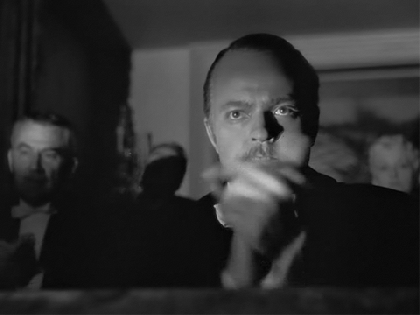
Maleficent. The Mistress of All Evil. Chernabog’s right-hand witch. The Disney villain all Disney villains strive to be. She has it all – the looks, the poise, the power, the laugh, the cunning, the ruthlessness! She doesn’t even need to sing a song because she’s already awesome enough without one. Marc Davis’ gothic design cuts a fine figure and Eleanor Audley’s subtle icy voicework is trés magnifique. As much as I enjoy Audley as Cinderella’s evil stepmother, Lady Tremaine was but an appetizer in comparison to the four-course banquet of pure villainy that is Maleficent.
This leads to a small point of contention some viewers have with Maleficent in spite of hitting top marks elsewhere: her motivation. Putting a hit out on a child for not getting invited to a measly party? Not exactly compelling, is it? And yes, it isn’t a deep motive…is what I would say if I wasn’t well-versed in folkloric tradition. In the original fairy tale and the movie (though it isn’t outright stated in the latter), the party for Aurora isn’t just your average royal kegger, it’s a christening. Back in ye olden days, christenings were very big deals. To not receive an invitation to one was a grave insult, so not extending an invite to your semi-omnipotent magical neighbor is just asking for trouble. In the fairy tale’s defense, no one had seen the evil fairy for years and assumed she was dead, though I can’t imagine how nobody thought Maleficent wouldn’t find about it eventually.
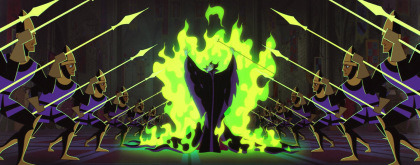
“You dare to deny me, foolish mortals? Very well, then! I shall have my own christening! With blackjack! And strumpets!”
Maleficent is proof that sometimes you don’t have to have an elaborate backstory, a god complex, a tragic past or the unfortunate luck to be on the wrong side of a conflict. Sometimes all you need is some magic, brains, class, and a whole lot of flair to be a perfect, intimidating, and unquestionably iconic villain.
Basically what I’m saying is these movies never happened. Got it?
Maleficent is disarmingly polite over being snubbed, even after Merryweather bluntly tells her nobody wanted her to come. She even brought her own gift for the baby – sixteen years of life cut short by the prick of a spinning wheel spindle, because why change into a dragon and destroy everyone all at once when you can draw the torture out over an agonizingly long time and deliver the coup de grace in the prime of a young woman’s life? That’s how Maleficent rolls, baby. She could dole out capital punishment when she has to without batting an eyelid, but causing human suffering is her bread and butter.
Stefan begs the fairies to undo Maleficent’s curse, but it’s too strong for them. Flora and Fauna insist, however, that Merryweather can use her gift to lessen the spell’s potency. Now instead of dying from that fatal prick, Aurora will sleep until she receives True Love’s Kiss™. Stefan’s not one to throw caution to the wind though, so he orders all of the kingdom’s spinning wheels to be burned in the meantime.
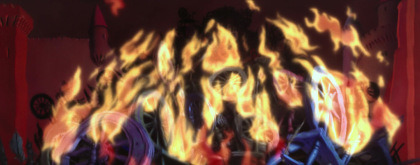
I just pray his kingdom’s economy wasn’t based on textiles otherwise they’re screwed.
As the peasantry celebrates Guy Fawkes Day several centuries early, the fairies ponder their next move. They’ve been around long enough to know that removing spinning wheels from the equation won’t put a damper on Maleficent’s scheme. This scene is incredibly effective in establishing two things:
Maleficent’s near-omniscient presence in the film
How well the fairies’ differing personalities play off each other
Maleficent rarely miscalculates her opponents, and that guile puts her one step ahead of the heroes, making her one of the few Disney villains to nearly reach their goal. The only mistake she makes in the entire movie is trusting her henchmen to do their jobs when she isn’t directly supervising them, though that’s more on them than her. The different methods the fairies propose to deal with Maleficent fantastically illustrate what kind of people they are. Fauna believes she’s just a miserable soul who could be reasoned with if they talk things over. Merryweather would rather take the fight to Maleficent and turn her into a toad. Flora, however, is wise enough to know Maleficent’s too wicked to plead to, too clever to bargain with and too strong to face head-on, so their best course of action is to focus on protecting Aurora through any means necessary. Her initial idea is to enchant the princess into a flower (her namesake is her specialty, after all), but Merryweather reminds her that Maleficent enjoys creating bitter frosts just to kill her flowers.
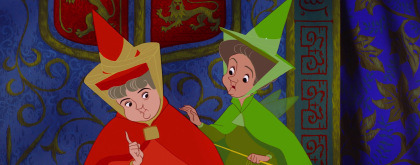
“Well we could try that but stick her in a castle with a beast for a while…nah, that’ll never work.”
Yet never one to give up, Flora alters the plan so they’ll raise Aurora as a peasant girl out in the woods. This means disguising themselves as humans and giving up magic for sixteen years so as to not attract Maleficent, but that amount of time is like twenty minutes to the fair folk. Stefan and Leah reluctantly agree to the plan, and the fairies spirit little Aurora away from the castle that very night.
Sixteen years later, Maleficent is infuriated that her minions have failed to locate Aurora, even more so when one reveals that they’ve spent the whole time looking for a baby instead of a maturing woman. In an interview with the Rotoscopers podcast, Don Bluth called Maleficent a very flat antagonist because she surrounds lackeys dumber than her so she could be the smart one among them and, again, her supposed lack of motivation. But come on, let’s not entirely condemn the bad guys for having too much faith in their underlings. It’s difficult to find minions smart enough to carry out orders but dumb enough to stay unquestioningly loyal. Usually you have to register as Republican in order to get some.
Maleficent gets her anger out in the most therapeutic way – throwing lightning bolts at her orcs, awesome – then leaves the job of finding Aurora up to her trusty raven Diablo. We then finally see the grown-up Aurora herself, whom the fairies renamed Briar Rose as a nod to the Brothers Grimm version of this tale.
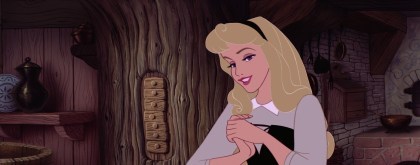
I know I’ve made the occasional case for the princesses from Walt’s era compared to the present day, and yet I have a hard time defending how…I don’t want to say bland. Bland would mean there’s nothing interesting about Aurora, and that’s a lie. She’s gorgeously designed and drawn, and even in her peasant dress she has an air of elegance and sophistication. She carries herself like a queen; her innate royalty reveals itself in her graceful movements. Mary Costa also gifts her with an excellent set of pipes. Hearing her song echoing through the forest is nothing short of magical. She’s a flower child who can talk to animals. She has dreams of escaping her adopted aunts’ loving but stifling care and being allowed to grow up, see the world, actually talk to people, and even find a life partner. She has some strong potential. It’s not that Aurora’s boring, she’s just not quite as developed as we’ve come to expect our animated female protagonists to be. I’m grateful for what we’ve got, but I only wish we could have more. What was her childhood like? How did she learn to communicate with animals? When did the fairies trust her enough to let her spend time out on her own? Did the fairies ever subtly teach her lessons in royalty through lessons and games? Heck, nobody bothers to keep her informed about Maleficent or her curse, and they act surprised when she’s shocked to learn she was a princess the whole time. I want to see what Aurora could have been like if she had known the truth already and what kind of steps she would take to defend herself. Blame the source material for this; it’s difficult to write a compelling main character when she’s supposed to sleep through most of her story.
The fairies send Aurora on a fetch quest so they can plan a surprise birthday party for her. Merryweather wants to bring their magic wands back out for the job, but Flora insists on taking no chances now that they’re in the home stretch. Fauna gets to live her dream of baking an elaborate cake (it’s thanks to her referring to a teaspoon as a “tsp” that I do it too), and Flora insists on making Aurora a gown fit for a princess using Merryweather as a dummy. And we also get one of the best burns in the Disney canon:
Merryweather: It looks awful! Flora: That’s because it’s on you, dear.
youtube
The fairies fall into reminiscing over raising Aurora and get teary over having to let her go soon. I see where they’re coming from, they’re the ones who raised her for sixteen years. They must have so many fond memories, not to mention they put all that work into learning to properly raise a child let alone live like normal human beings seeing how two of them still can’t sew or cook without magic. I wonder what that was like –
No, NO, you CGI abominations DO NOT exist! Go back to the fires from whence you came!!
“Ugh, I’m gonna need something strong to expunge that from my eyes.”
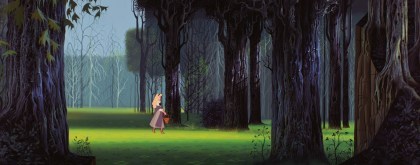
There we go.
Aurora wanders through the forest, drawing out the usual bevy of cute woodland critters with her singing. She also catches the attention of a grown-up Prince Philip (Billy Shirley) who’s more dashing and considerably less blonde than he was sixteen years ago.
By this point, the Disney animators were far more confident in their ability to draw realistic but expressive leading men, hence Philip’s expanded role from the story. He’s also the first Disney prince to have a personality; not a terribly deep or defined one, but it’s a step up from his nameless plot-device predecessors. There are some signs of him being a hopeless romantic, he gets a few funny lines here and there, has a sturdy friendship with his horse Samson, and is fiercely determined when it’s time to kick some ass. He does have the same problem as Aurora in he randomly decides to stop talking for the rest of the movie once he reaches the midway mark (at least Aurora has the excuse that she’s sleeping for that remainder), but I suppose you could chalk this up as to him wanting to spite Maleficent with his silence.
The animals steal some of Philip’s clothes so they can pretend to be Aurora’s dream prince. Aurora plays along as she sings the movie’s standout song, “Once Upon a Dream”. Philip and Samson watch until he smooths his way into the dance. Once Aurora discovers the switch, Philip gets a little too up in her personal space for my liking, constantly grabbing her hand so she doesn’t run off and pulling her closer to him. Not as horrible as what the prince does to the sleeping princess in the original story (a questionably consensual kiss is a trifle compared to how the scumbag of a prince treats her there), but still a bit iffy.
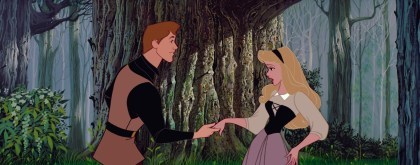
“It’s a good thing my aunts taught me to never go anywhere without a loaded pistol taped to my back.”
But once Philip backs off a little and joins in her song, they both dance together and OEHSGBJSGBLL…
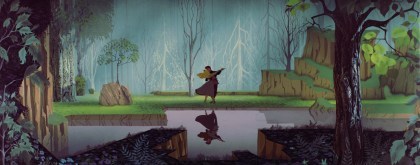
I think I’m going to need surgery to get my jaw off the floor back into its proper place thanks to this movie.
As per Disney tradition, Aurora and Philip’s waltz means the two are head over heels in love with each other. But when it comes time to finally exchange names, Aurora panics and runs away, though she sticks around long enough to tell Philip to meet her family at the cottage that evening.
Back at home, the party preparations aren’t proceeding as planned. Flora’s dress looks as good as my attempts at dressmaking, and Fauna’s dessert wouldn’t feel out of place on Cake Wrecks.
A fed-up Merryweather reads Flora and Fauna the riot act and convinces them to finally take up their wands again. This produces more desirable results, though Merryweather still gets stuck with cleanup duty.
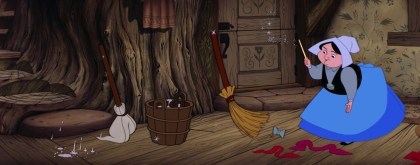
Enchanting a broom to come to life and do your dirty work? I don’t see this going wrong in any possible way.
Things start to go south when Flora and Merryweather argue over the dress color and it escalates into a full-blown wizard’s duel. This gag was supposedly based on the animators’ arguments over what was Aurora’s proper dress color. I think they should have compromised and combined both colors to make purple, which would go lovely with Aurora’s violet eyes, but what do I know. I’m just the illustration major writing a blog. Unfortunately, while the fairies remembered to cover every door, window, and crack that could expose their magic, they overlooked the fireplace. The sparkly residue of Flora and Merryweather’s fight fly up the chimney, alerting Diablo to their hideaway.
Going back to what I said earlier about this movie providing some commentary on feminism, consider this: Flora is obsessed with pink, a traditionally female color, and she gives Aurora an attribute that is oft preferred in a woman but not the most important quality, beauty. Merryweather, on the other hand, is all about blue, a color usually geared towards boys, and she has much more common sense and practicality about her. Though Merryweather and Flora are able to put aside their differences in personalities and approaches for a common goal, it’s when they refuse to compromise and begin prioritizing which color – ie. which ideology and extension of themselves – that they want Aurora to step into that they lose sight of what’s important, and allow everything they worked for to collapse on itself. It’s played for laughs very well, sure, but if not’s symbolic of the dichotomy between traditional femininity and modern sensibility that tears apart the feminist movement then I don’t know what is.
The fairies manage to fix their messes in time for Aurora’s return. She’s thrilled with their gifts but shocks them all when she announces her new boyfriend is coming over for dinner. They come clean about her heritage and betrothal to Prince Philip, and Aurora runs up to her room in tears over the fact that she’ll never see her one true love again. That and her entire life has been a lie and she’s being carted off to meet parents she knows nothing about to marry a man she’s never met and rule an entire kingdom with no prior experience or knowledge. But mostly the true love thing.
Meanwhile, Stefan and Hubert are making wedding plans over wine with “Skumps”, the preferred toast between me and my friends. Also adding to the humor is a minstrel who keeps stealing sips until he literally drinks himself under the table.
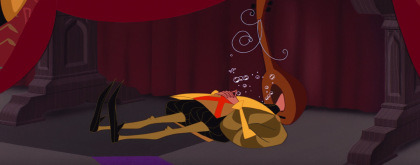
This was also his way of getting through the Black Plague, co-opted by the rest of the world six hundred years later.
Philip returns and Hubert goes to greet him. He thinks his son is thrilled at the prospect of marrying Aurora but is disappointed to learn that he’s fallen for an anonymous peasant.
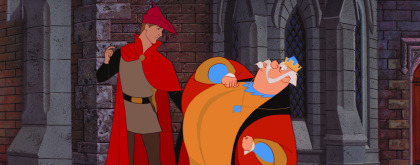
“At least tell me if she’s royalty in disguise so you don’t elope to Sicily!”
Philip rides back into the woods for his big date, leaving Hubert with the unenviable task of breaking the bad news to Stefan. As for Aurora, the fairies smuggle her into the castle and prep her for her homecoming. She’s still blue over having to ghost her forest hubby though, so the fairies give her some time to herself.
Biiiiiiiiig mistake.
So imagine you’re me, growing up watching this movie on tape on a television set with a very standard but not spectacular sound system. Then years later you download the remastered soundtrack and give it a listen while you’re falling asleep. You’ve got the whole score memorized, the volume is nice and low, it’s all good.
And then, just as you’re drifting off, you hear a ghostly voice singing in your ear “Auroraaa…Auroraaaaa…”

That reminds me, I haven’t had a chance to talk about the music yet, haven’t I? Forgive me for waiting so long to do so but my reaction to it is equivalent to the visuals. The score is taken straight from the Sleeping Beauty ballet by Tchaikovsky, the same composer as The Nutcracker, and it is lush, sweeping, sumptuous, just…

While George Bruns was mostly faithful with how the score was represented within the context of the ballet, at certain points he took the same approach as The Nutcracker Prince and rearranged the music order to underscore totally different scenes to staggering effect. The beautifully ominous music where Maleficent appears as a ball of green flame and leads the hypnotized Aurora to her doom? It’s from one of the ballet’s divertissements where Puss in Boots dances with his girlfriend. But tell me which is more fitting for a musical composition such as this – two cats pirouetting around each other in a crowded ballroom, or eerie pitch-black spiral staircases illuminated by green fire as a cursed princess inches closer to her dark destiny against her will?
youtube
The fairies realize their error and frantically search the maze of secret passages for Aurora. Though the princess resists Maleficent’s commands for only a moment, they are still too late to save her from fulfilling the curse. Maleficent gloats and leaves the fairies to wallow in their failure. It’s made even worse as the merrymaking from the oblivious revelers below ring out while they put Aurora to bed in a tower and mourn over her. It’s heartbreaking: they raised and loved her as if she were their own daughter, and they still couldn’t protect her. Everyone talks about “Baby Mine” and Bambi’s mom as huge tearjerkers, but why is this scene constantly forgotten?
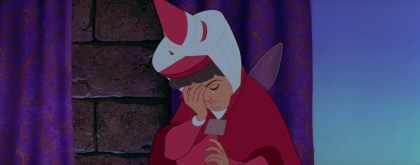
Stupid onions, stupid stupid onions…
Fauna and Merryweather can’t even begin to imagine how heartbroken Stefan and Leah will be, but Flora has a solution: put the kingdom to sleep along with Aurora until she is woken up. I understand her wanting to spare Aurora’s family some pain, but conking out an entire principality for god knows how long to cover up their failure? AND at a time when Europe was all about invading and conquering itself? Are we sure this isn’t just part of Maleficent’s overarching plan for revenge? This sounds more like something she would come up with instead of the leader of the good guys.
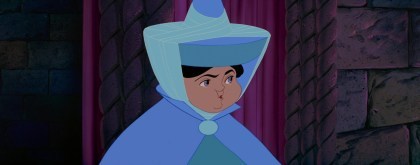
“So what happens if one of the neighboring kingdoms decides to attack while everyone’s sleeping?”
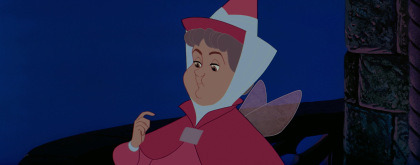
“Then we’ll put them and their armies to sleep, too.”

“And once Aurora is saved, both kingdoms will immediately wake up to find themselves thrust into a war they’re barely prepared for, is that correct?”

“Oh, you’re right, that’s a terrible idea.”

“Finally, thank you.”

“I’ll just turn them all into flowers.”

“THAT’S NOT AN OPTION!!!”
The fairies flitter about the castle grounds spreading their spell over the unwitting royal court, even putting the candles and sconces out. We have another reprise of the “Gifts of Beauty and Song” chorus now altered to sound like a lullaby, providing an interesting bit of symmetry between it and its earlier use in the film. Whereas it first underscored their blessings upon Aurora, now it plays as the fairies are giving the “gift” of sleep to the entire castle.
While Flora knocks out the throne room, she overhears Hubert muttering about Philip eloping with a peasant girl and she makes the connection. The fairies speed to the cottage just as Philip arrives there. But once again Maleficent beats them to the punch. Her goons ambush Philip and she watches them wrestle and bond him with fiendish glee.
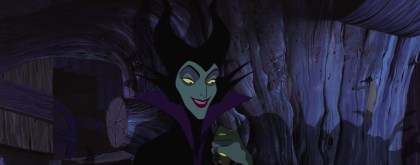
You magnificent, kinky bitch.
Maleficent was only out to capture the one man who could break Aurora’s curse; the fact that he’s really the son of her nemesis’ allies is just icing on the cake. Flora, Fauna, and Merryweather resolve to rescue him from Maleficent’s fortress in the Forbidden Mountain.
Some movies reach the brink of greatness only to falter when it comes to the final act. Sleeping Beauty is not one of them. Everything that happens from the moment we slowly zoom in through the purple mist on to the Forbidden Mountain itself up until the storybook closes is perfection. The perfectly paced action, the animation, the music, Maleficent’s hideaway in all its decaying glory (I swear it’s like Jean Cocteau meets Frank Frazetta meets Giotto) all make for the climax of climaxes.
The fairies shrink to insect size and silently sneak through Maleficent’s creepy domain, narrowly running into guards and gargoyles at every turn. They traverse the stronghold until they find her overseeing a hellish bacchanalia in honor of her supposed victory.
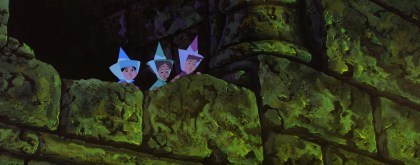
“My old gaffer would have a thing or two to say if he could see us now.”
Soon Maleficent gets bored and goes to “cheer up” her captive. Then we have it: The Moment.
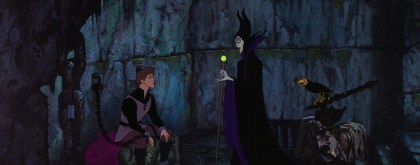
I’ve talked about this before, that one small, devious step further the villain takes to make themselves more heinous in our eyes. It’s the Wicked Witch taunting Dorothy with visions of Aunt Em. It’s the Beldam hanging Other Wybie’s remains. It’s virtually everything Heath Ledger’s Joker does. And it is this simple scene where Maleficent details what she plans to do with Philip. She spins “a charming fairy tale come true” of Aurora sleeping without aging, waiting for her prince to come to wake her. And Philip will escape the dungeon, ride to her rescue and prove true love conquers all – in one hundred years, when he’s a broken old husk of a man on the brink of death. DAMN. If you want to know why Maleficent is considered the best of all the Disney villains, it’s not just all her previously praised qualities, it’s her sheer sadism and the pleasure she takes in it.
The fairies enter and free Philip once Maleficent departs. The course of true love never runs smoothly though, so they arm him with the Shield of Virtue (licensed by Carefree Maxi-Pads), and the Sword of Truth to aid in his escape.
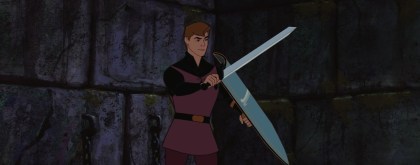
“So, why’s it called the Sword of Truth?”
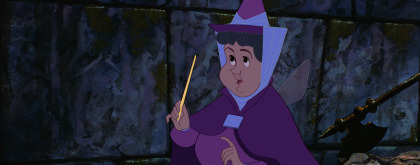
“Anyone who’s subjected to it speaks only the truth…as they bleed out and die, of course.”

“Cool, cool. On an unrelated note, I think I’m gonna go to DC for my honeymoon.”
Diablo sounds the alarm and the Battle With the Forces of Evil kicks off with Philip slashing his Sword of Truth through Maleficent’s goons.
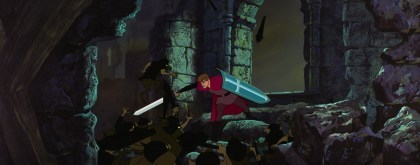
“I steal lunches from the break room fridge!” “I broke wind last Tuesday and blamed it on the dog!” “I cried like a little girl during The Good Place finale!” “I only wash my hands for NINETEEN seconds at a time!”
Philip makes his getaway on Samson and the music reaches truly operatic levels as Maleficent does everything in her power to end him. Yet Philip soldiers through it like a boss. Crumbling mountainsides, Maleficent hurling lightning from the sky and summoning a forest of thorns to block the way? Fuck that shit, he’s gotta go save his girl.
Then, as Philip cuts his way through the briars, Maleficent looks at her watch, realizes it’s No More Fucking Around O’Clock, zooms over to the castle, throws down the most intimidating challenge ever –
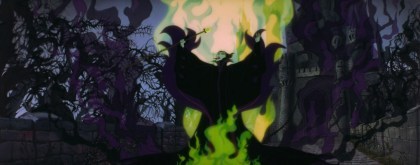
“Now you shall deal with me, O Prince, and all the powers of HELL!!”
– and with that, she takes her final form: a massive fire-breathing dragon.
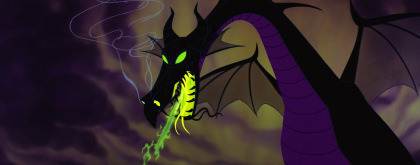
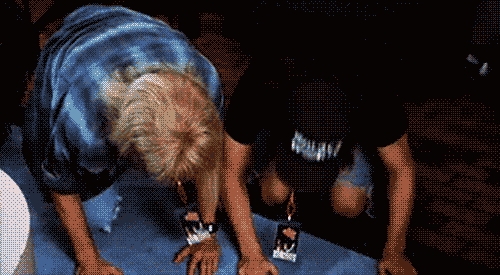
Every Disney villain who’s gone kaiju in the final act owes everything to this gorgeous terrifying beast. The dragon is an awe-inspiring unholy fusion of style, power and darkness. There’s a reason why she’s the final boss in Fantasmic; the chance to watch a live dragon battle is too cool to pass up.
Speaking of battles, Maleficent’s dragon form was animated by Woolie Reitherman, who previously brought us such gargantuan monster clashes as the T-rex brawl in Fantasia and the escape from Monstro The Whale in Pinocchio. And when you have a dragon confronting a fairytale prince, well, you know what’s coming.

Maleficent backs Philip on to a cliff surrounded by flames, leaving him only one desperate shot. With a little extra magic from the fairies, he throws his Sword of Truth at Maleficent and it plunges right into her heart.
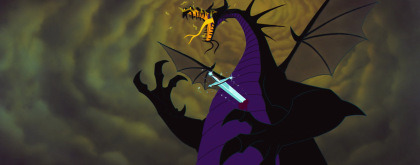
“I liked…Frozen 2…more than the first one…”
Maleficent’s spells die with her, clearing the way for Philip. He gives Aurora that wake-up smooch and everyone in the castle slowly rouses, owing their inexplicable simultaneous twenty-minute blackout to the unusually strong wine.
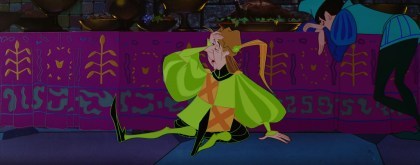
He can attest to that fact.
The royal families are happily reunited, and the film ends on Flora and Merryweather fighting over Aurora’s dress color yet again as she and Philip waltz together on the clouds using animation Beauty and the Beast would borrow thirty-two years later.
Sleeping Beauty is a movie I can never have on in the background because the moment I look up from my work I am spellbound by it. Do I need to elaborate on how this is one of the most beautiful looking and sounding movies Disney’s ever produced? Sleeping Beauty is the swan song of Disney’s first golden age of animation. For better or for worse, their animation process would switch to the rough, cost-cutting Xerox process starting with their next feature, 101 Dalmatians, and few films would reach Sleeping Beauty’s level of gorgeousness ever since.
Though a massive financial and critical hit on release, it wasn’t enough to make up for the monstrous production costs, not unlike Fantasia. Thankfully, home video sales revived interest and made it Sleeping Beauty of the top-selling VHS tapes of the decade, cementing it as a bonafide classic. It’s one of my favorites from Disney for its stunning visuals, gorgeous music, phenomenal villain and overlooked but great cast characters. Revisit it if you haven’t already.
Thank you for reading! If you enjoyed this review, please consider supporting this misfit on Patreon. Patreon supporters receive great perks such as extra votes for movie reviews, movie requests, early sneak-peeks and more! Special thanks to Amelia Jones, Gordhan Rajani and Sam Minden for their contributions!
Artwork by Charles Moss.
Screencaps from animationscreencaps.com
March Review: Sleeping Beauty (1959) Whenever I discuss Sleeping Beauty with someone who doesn't share my enthusiasm for Disney, they have an irksome tendency to get it muddled with Snow White; their excuse being "it has the same plot".
#2D animation#angelina jolie#animated#animated feature#animated movie#animated movie review#animated musical#animation#animator#animators#anthropomorphic animal#aurora#ballet#barbara luddy#battle#battle to end all battles#battle with the forces of evil#bill shirley#bill thompson#blue#briar rose#cake#charles perrault#classic disney#curse#diablo#Disney#disney animated#disney animated feature#disney animated movie
29 notes
·
View notes
Photo

UPDATE!! THE STUDIO IS STARTING UP FROM THE GROUND UP (again...)
After months of only a few pictures and no activity, I realized I should've given myself more time to start this page so I'm confident to announce a proper hiatus to make sure I start my studios properly. Below are things I want to clear out
Am I going to delete this blog?
I will be deleting this blog and make a new tumblr off of this one (As the tumblr I’m on now more of my personal than buisness)
Will the content on this page be the same?
Best answer will be no. I am going to show work from clients (if they do allow me) and personal work. However, I have put some thought into whether or not I will also post comics or not.
Am I going to keep the Nerd with a Pen/Will I stop Nerd with a Pen?
I am ending Nerd with a Pen, the reason is that I didn't put enough work and rushed into it. While it is gone, I am working on a new webcomic series that is a revival/reboot of Nerd with a Pen and that's gonna be all I say about it.
Are there projects or comics in the works?
Yes there is, I have created stories along with my boyfriend and partner based on various video games and an original story as well. Our current one in development, Project Sonic Ruby, is one that we're both excited for.I also have the reboot of Nerd with a Pen. I will show some concept in the future of it's creation.
Currently, I am doing character design work for a children's book
Will I put up creations that consumers can buy?
I would love to do that. I am working on selling desktop and phone wallpapers. I'd like to sell prints of my art but I need to look more into it before jumping in.
Are there other plans I have?
I plan on starting up a youtube channel for gaming and game reviews (since video games are a passion of mine). I'm looking into animation for shorts and gifs. There's alot I want to do so give it time to do all of this.If there are anymore questions, just as me!
1 note
·
View note
Link
New interview from Pedro. Did my best to translate to English.
Enjoy!!
**************************************************************************************
Looks like Pedro Pascal is in every possible universe. Here and there. In the past, in the present and in galaxies far, far away. Today, the actor is considered the great benchmark of entertainment and one of those in charge of saving a franchise that seemed lost. Sufficient reasons to talk exclusively about discipline, gastronomy, creeds and how he swallowed his dad in 30 seconds.
The SAR defines 'creed' as the set of ideas, principles or convictions of a person or group. For example, by creed, one can leave his country and be in exile. It just so happens that one can leave the loved one behind. Or simply live in another reality. And you can also put on a helmet to pretend never to take it off again. If that is the way to go, the creed says that it must be done with the profession of faith and without stopping to look. As he turned the pages of the script for The Mandalorian, the Disney+ series that revived passion and nostalgia for the Star Wars franchise, Pedro Pascal came across this definition in every dialogue and moment, and reflection worked his way.
It has been more than two decades since the Chilean-American Pedro Pascal began his acting career and today, named as the great benchmark of 2020, misses the theater and still hurts him not to have the discipline to exercise and maintain a healthy diet while recognizing the ironic of having the best year of his career in the midst of one of the worst in recent history. But even in physical solitude, the man who carried Christmas's best-selling baby rescues many positive things and shares the vision of the universes he has traveled through, his passion for distant galaxies, and how to traumatify your family with a simple TV scene. In interview, the Mandalorian of Latin America.
IMDB named you the 2020 benchmark in entertainment, a year in which the world took refuge in fiction. What was it like to live your best time locked up and what do you rescue on a human level from him?
The strength of family relationships and friendship. For them, we endure this physical loneliness. I find it ironic that in 2020 I received projects so well received by the public, although they were carried out before the pandemic and their impact was during this one, and that year I was isolated and alone. But I must stress that loneliness is a privilege when many people had to keep working, surviving and maintaining the functioning of the world. We just had to be alone, but they had more than that and you have to value it too.
Among the activities you've lost, how much do you miss the theater?
A lot, really. It's something I miss most and being with people without feeling afraid. See a play and return to those experiences of being with people doing and living things in common. That's what I need most, besides my loved ones.
Disney went into streaming and its strong card has your face, what do you think of the discussion of platforms against movie theaters?
In streaming there are amazing things and many people develop great projects that they didn't access before. The diversity of voices is taking its way and it is important to recognize that opportunities grow exponentially and limits change. It's amazing how much availability we have to very well-made content and how creative people can share their work in different ways. But I also want to be honest: limiting the experience of viewing content only on our gadgets or at home is a mistake that affects the stories we can tell. A mix of opportunities and challenges must be achieved.
Leaps between the fictional universes that mark the last decades until they reach the universe of universes. What is your first Star Wars memory and how do you sum up the essence of this legendary story?
For me, Star Wars is nostalgia itself. It's one of the primary things in my memory, of my childhood. I came to the United States with my Chilean family when I was under two years old and one of my first memories is going to the movies with my dad to see the saga; it becomes one of those romantic things about childhood, that open your mind, so imagine how special it is to participate in this project. I think the creators of The Mandalorian fully understand this nostalgia and power, and they managed to count on that element as a great ally for the Star Wars world and I can't be happier to be a part of it. (Of which we look forward to the third season The Mandalorian)
The Mandalorian exploits the power and nuances of your voice, did you have that letter on your resume?
I didn't know I could do it, but I resorted to my theatrical preparation, which was very physical at all levels and feelings. There are elements that have to do with creating a role, and they teach you that voice is a primary thing, something you have to start with and can't hide. Now I've learned a lot more about the importance of that, and how to use it with economics. The body also has to do with it, because something very subtle communicates something. At The Mandalorian, I had a great time figuring out how to do it, they gave me the opportunity to develop it in different ways. The opportunity to be very intense in it.
What about the ego when someone works under a suit and mask?
In the conversations about the project, before doing so, we were informed of the idea and concept of the whole season, so I clearly understood what it was. I wanted it to be the most powerful version of what they were trying to accomplish, so it didn't make sense for me to involve my ego, you know? It was already very clear what the project meant, so I knew about the character, the piece he represented for himself and the opportunity it was for me, so I was just focused on better executing the part that touched me in all this. In the theater, I worked several times under a mask and it helped me develop the experience.
It seems that The Mandalorian has a very theatrical base...
Exactly, and thanks to the physical experience of working in theater, making a play a few times a week, discovering how your body and your voice communicate, being part of an entire image, and how you will tell that story visually, I achieved this character. I never imagined it would be something I would have to use in such an important Star Wars project.
On the list of entertainment greats, there are names like Steven Spielberg and George Lucas, do you think John Favreau's should be added to the list?
I think his name is already included. Without a doubt, it's in that category and it's amazing. I'm fascinated by his vision. I remember a chapter in the second season, and I had some boots and I walked so much in the snow, that it stuck to them. He noticed, so he talked to the art department about the kind of boots you need when you're in the snow. They came up to me and gave me some new ones that fulfilled the idea I was looking for. He noticed it in an instant. It is such a wonderful detail and is repeated at scale in every session with it. Think of absolutely everything and your vision of using technology is admirable. He's someone who makes you feel motivated and always sees how to achieve the goal.
One of the reflections of the series is on how and under what circumstances a man can break his creed and the way he lives. What makes you break up with your beliefs?
I think you must follow your heart so as not to repent of anything; even if it sometimes brings pain or conflict, deep down when you go back, it's all worth it because it's what you heard in your heart. I'm very afraid to deny that feeling or not to take care of it. Now I'm 45 years old and I can't believe I have a finer philosophy. Make him more disciplined. It's ridiculous, but I'm trying to accept that I am and that's all I can say, "Follow your heart." Although, you know, I still don't follow a good diet, I still have trouble sleeping or exercising.
Are you still good at Chilean empanadas?
Yes, I couldn't stop. And also how good that I don't live in Mexico City because I would only spend it eating. I could move my whole life to the defe just to eat.
I want to deviate and ask you, who did you see the chapter of your death in Game of Thrones and what trauma did you cause to your family?
For me, no trauma. I separate myself well from the characters, although I fully understand that if I were a Game of Thrones audience and loved that character, it would make an incredible impression on me. Thank you, it wasn't. I had to interpret it and there was a model of my head to be crushed that way with the tubes and the fake blood, you know? I lay there, with pieces of my flesh, it was funny in the end. But not for my family. There's nothing funny about them and it's traumatic. My dad totally changed his voice when we saw the episode, turned around and said, "I didn't like it, Pedro. No, Pedro, not this."
The media found similarities between your villain in Wonder Woman: 1984 and Donald Trump. When you play a character with characteristics like that, do you humanize or understand it?
The project had nothing to do with the former president. I was always told that my character in Wonder Woman:1984 was emotionally messy, and I took that and took it as far away as possible. Instead of creating it with images or certain inspirations from life, it was more working with what was on the page. Personally, what made sense to me is the size of the story being told and there's always more, and we all want more. Creatively, if this makes sense, that meant "flying it out of the park." Connect a hit with the character and be committed to telling their story faithfully, in a way that was true to me. So all the exterior elements found their way.
What way to start 2021 with the theme of the Capitol... how do you perceive that moment?
I am not a politician and it is not that I have no opinion on such events; However, there is no need to express the obvious. My opinion would be very simple compared to that of a person who studied this, who knows how to act in these kinds of scenarios; I think I'm next to the majority who lived this, which is the logical result of what we've been through over the years and we're all horrified. It was distressing to see this violence.
If you had the monolith in your hands, what would be your wish?
My wish would be... it's impossible, the truth (laughs). I think it's being together again, with less fear and people having a chance to connect.
What is your position of the reality that Chile has experienced in recent years and how has the relationship with your country been since exile?
It's something I'm developing and I keep doing it in my life, trying to understand that it's my home. Being in Chile is being at home, but my life has been very nomadic, living different things and having many influences; so it's strange, I don't feel the title of a full Chilean identity or an American.
Neither from here nor there?
In a sense, but I'm also completely both. My parents are Chileans, my brothers were born there before my parents traveled, and I returned sometimes because my family is so big; in fact, my parents came back. It's always been there, it's still developing, and it's going to be a part of me. I don't know if I answer your question, but it has a lot to do with who I am.
What is your relationship with Latin American cinema? Interested in you?
A lot, it's invaded me in life like American cinema. The movies I have in my heart, seeing something like And your mom was also something that changed me; I also love the work that comes out of Chile, and all I can say is that it is a cinema that needs more access and projects.
You got a comedy with Nicolas Cage on your doorstep today, can you tell me something?
It's my first chance at comedy, as a complete story within the genre. Speaking of American influences, in the 1980s I saw all the films where Nicolas Cage was coming out, he came into my life and it's great to be his partner after seeing all his performances.
What's your relationship with the comedy genre like?
I love it, I've done a lot of comedy in the theater, what happens is that in film and television themes, I was always part of drama castings. And in the cinema, you go where the doors open; although I identify with one or the other, I think being an actor, you go and do what you have to do. Comedy is something unique, it's very challenging because it has to be very real to make it funny, you can't hide or use normal tricks. I was very excited to have this challenge in front of a camera.
Finally, Pedro, after going through so many fictional worlds, literally, what do you dream of when you sleep?
I dream that my bathroom is dirty, that I haven't done my math homework, that the oven and all that stuff are on. Of course, there are times when I close my eyes and see myself in all these projects, although my conscience is with the anxieties of the day you can imagine.
1 note
·
View note
Text
Frozen II – my thoughts on Elsa’s outcome (warning – long and full of spoilers)
At this point, my only real objection to the ending is the fact that separation endings have been way, way overdone in the past year. If Ralph Breaks the Internet, Toy Story 4, How to Train Your Dragon 3, Maleficent: Mistress of Evil, Steve’s outcome in Avengers: Endgame, and the finale of My Little Pony: Friendship is Magic didn’t exist, my feelings would be almost fully positive. Especially because Elsa and Anna will still see each other all the time, they just don’t live under the same roof anymore.
I also have a minor quibble about the idea that growing up means you “need” to live apart from your siblings or extended family (not that the movie ever says that, it’s just a cultural norm). And when I read comments from fans saying “Yes, it’s slightly bittersweet, but that’s realistic, it’s a mature ending,” I feel a little sad that not even Disney is letting kids believe in happily ever after anymore. This applies to the whole separation/bittersweet ending trend throughout the past year’s family media. Again, these are minor issues.
But as a person on the autism spectrum who, like so many, feels a connection to Elsa, I love the way things turn out for her.
First of all, there’s the fact that for all of Elsa’s popularity, the protagonist of the original Frozen is Anna, and Elsa, though certainly not the villain, is, in terms of story structure, the main antagonist. Throughout most of the first film, her powers are a deadly force to be overcome – the endless winter must be stopped and Anna’s frozen heart must be thawed. Yes, the beauty of her powers is also highlighted and she fully realizes and shares that beauty in the end, but for the most part her magic is still a negative presence in the story. There’s a reason why so many viewers see it as analogous to a mental disorder.
Also, as many have pointed out, “Let It Go” has a bit of a Misaimed Fandom. Meta joke about how overplayed it is aside, it’s no wonder that in the sequel Elsa cringes at the memory of herself singing it. Yes, it’s an empowering anthem and it’s a good thing that she finally stops suppressing her powers, but it’s a bad thing that she turns her back on her people, her responsibilities and her sister, and while she’s reveling in her new freedom, she’s unwittingly burying Arendelle in snow. In the end she has to go back and give up some of that freedom, and even though she’s happy, it can still ring bittersweet to those of us who connect with the song.
The analogy is imperfect, but I do think of how my own situation with mild autism compares to Elsa’s. My huge emotions, panic attacks and ferocious meltdowns, so hard to control (see the Intense World Theory), and my difficulty with social interactions and playing by society’s rules in general. The concept of a person born with destructive magical powers tied to her emotions is an apt analogy. Her years behind closed doors bring to mind my own introversion and social anxiety. I hear “Conceal, don’t feel” and think of all times I’ve been instructed or scolded to keep my unruly emotions and odd instincts under control. Like Elsa’s powers, my autism has some beauty in it too: my intelligence, creativity, good memory, etc. But it’s still a disorder that society isn’t built for, and generally it’s something I need to mask around others. Also like Elsa, I’ve struggled with guilt and with feeling like a burden to my family. I know I’m not alone in relating to her for these reasons.
So imagine my vicarious thrill over “Show Yourself.” When Elsa finally learns the origin of her powers and learns that she was born that way for a reason – that it isn’t a curse, or just a random difference, but a gift. When she steps fully into her power for the first time, and unlike in “Let It Go,” it’s unambiguously a wonderful thing, both for her and for others. When she finally fully embraces self-love, realizing that everything she thought she needed from the outside is already within her (“You are the one you’ve been waiting for”) and that it’s time to fully show herself to the world. When she goes on to truly “see what she can do” and “test the limits and break through,” as she once sang, but this time in a heroic way, saving her people from her grandfather’s past sins – not from her own mistakes for a change. The moment I first learned about the plot point of the dam and the tidal wave that would destroy Arendelle if it fell, I was thrilled by the thought of Elsa using her powers to stop that tidal wave. The character whom we misfits relate to thoroughly leaves behind her old “sympathetic antagonist” territory and becomes a true heroine, taking her raw power that once endangered the kingdom and using it to save it.
(This is another reason why I don’t believe the rumors that she was originally supposed to stay frozen and that her revival is a Focus Group Ending. In the first place, what would be the point of her glorious self-actualization if it were only leading to her death? In the second place, who would stop the flood?)
I’d love to have the kind of experience she does. I wish I could learn that everything “disordered” about me is actually a gift and that fully being myself will bring good things both to me and to others. Maybe someday this will happen, but I don’t see it happening any time soon, so to see it happen to Elsa is incredibly therapeutic.
Then we have her becoming the forest’s guardian in the end. At first the idea made me uncomfortable because I thought it might seem to say that people who are different belong outside of human society. But the fact that she still regularly visits Arendelle and evidently stays close to the Northuldra too puts that concern at ease. I also understand why some people who relate to her are upset that she gives up her throne, because it was therapeutic to see someone so different and insecure not only find love and acceptance, but be able to rule a kingdom too. I agree that if she had wanted to stay queen forever, that would have been perfectly fine. But I think it’s perfectly reasonable that in the end it’s not what she wants.
Isn’t it arguably a bit of a waste for Elsa’s epic powers, which can alter landscapes, build castles, create life or take it, etc., to be confined to making pretty decorations and skating rinks? Isn’t it reasonable that after her self-actualization, she prefers a life’s purpose where her powers are central, since they’ve always been her chief defining feature and shaped most of who she is? As opposed to the life of a queen, where they’re only incidental? I can’t help but remember how much I struggled in school, from first grade through the first two years of college, when my hyper-focused passions for the arts, music and stories (the hyper-focus being an autistic trait, the passions being tied to the hyper-emotional sensitivity I’ve mentioned) had to be treated as just “what I do for fun in my spare time,” while math (UGH!!!), science, and other things i had no interest in and no talent for were treated as my life’s purpose. I also think of all the people in mundane corporate and blue-collar jobs, which I’m grateful every day that I’ve been lucky enough to avoid so far. If they were to find new jobs that reflect their greatest talents and unlock their full potential, wouldn’t we want them to take those new jobs? This is why I’m happy that Elsa’s new life purpose revolves around nature and magic.
Yes, I’ve read the complaints from some fans that Elsa has “lost some of her humanity,” and that’s fair. But let’s not be too quick to equate “humanity” with normality and “inhumanity” with difference. even if said difference is supernatural magic. Another reason why I like Elsa’s outcome is that Disney hasn’t always had the best track record with misfit characters who remind me of myself. I love Beauty and the Beast, especially from a feminist viewpoint, but when I see myself in the Beast, I sometimes feel awkward about his arc. I know they probably didn’t mean to code him as autistic, but still – a misunderstood loner outcast, to whom neatness, grooming and manners don’t come naturally, who struggles with the most basic social skills, who fails to understand others’ emotions at first, and who has massive meltdowns of rage when he’s under stress? How can I not see it? The fact that his journey consists of his being “tamed,” learning to suppress all his raw emotions and rough edges to please Belle, and that his happy ending is to become fully normal by becoming human again, doesn’t make him much fun to relate to. Give me a character like Elsa, who learns that her differences are her strength.
Elsa’s ending is just what I wanted for her, because it’s what I want for myself. Identifying with her is a more enjoyable thing than ever now.
17 notes
·
View notes
Text
I Need You: Why Evangelion Still Matters

If you’re even a casual fan of Japanese animation (colloquially known as anime) you’ve probably heard of a few classics held up as the best of the medium; films and television shows whose place in the history of Japanese culture is widely regarded as secure: Akira, Cowboy Bebop, Ghost in the Shell, Spirited Away, to name a few of the most prominent. They all have their critics, but few would dispute their place as landmarks of the industry. But there’s one classic piece of Japanese animation however whose legacy is far more contentious and which sparks controversy even today. Like the aforementioned pieces it’s well-known and has been watched by many, but unlike them it remains quite controversial, beloved by some and derided by others.
I’m talking about Neon Genesis Evangelion,¹ Hideaki Anno’s 1995 post-apocalyptic series about teenagers who pilot giant robots (known as mecha) in a war for the survival of humanity. And in my opinion it’s actually one of the best and most important television shows of all time, animated or not.
(Spoilers ahead, though I’ll try to keep major revelations to a minimum.)
I realize that in making my claim, I’m setting myself up for criticism. The value (or lack thereof) of Neon Genesis Evangelion has been one of the most heated debates in anime fandom for decades. But even on the purely objective level of its influence on the animation industry, both in Japan and beyond, NGE and its subsequent spin-offs, sequels, and re-imaginings is a significant work worth consideration. Although the show is decades old now (the first episode aired October 4, 1995), I believe it’s still worth examining why the show’s so acclaimed and why, in my opinion, it’s still relevant today, in no smal part because of the lessons it still has to teach us about self-acceptance.
(An earlier version of this essay was posted 4 years ago here.)
Weaving a Story
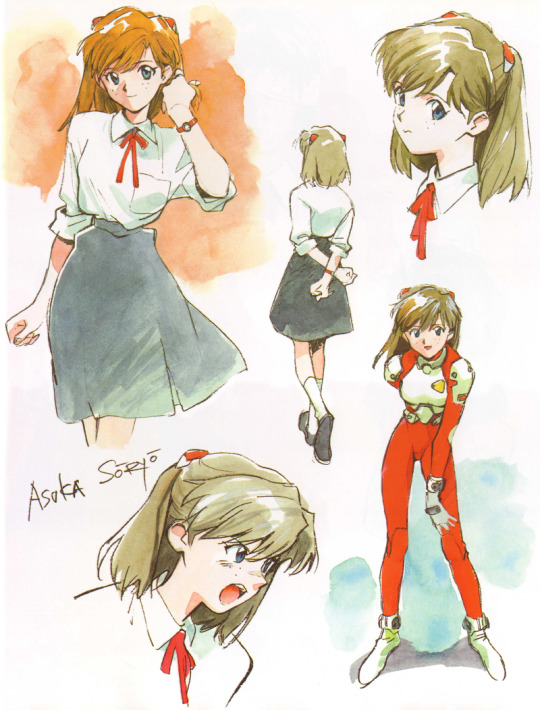
Concept art for Asuka Langley Soryu, the Second Child
Today, Evangelion is a major franchise, incorporating films, comics, video games, and more. But it all started with one TV show, Neon Genesis Evangelion, created by Hideaki Anno for Gainax. Even from the start, NGE was somewhat exceptional. In the early-to-mid 1990s when it was produced, most of the major animated shows on air (both in Japan and America) were heavily merchandise-driven and sponsored by either toy or video game companies. Nearly all were owned by a major studio like Toei or Toho. Conceived of by a single individual and owned by a small creator-run studio, Neon Genesis Evangelion was highly unusual and something of a creative risk.
The story of Neon Genesis Evangelion is, on first glance, nothing remarkable for Japanese animation. A group of teenagers are recruited by a unified global government to pilot giant robots (mecha) in a battle for the survival of humanity. In the process they have to face not only their deadly adversaries but also learn how to work together as a team, overcoming their many differences and personal issues. Gundam, Macross, and Hideaki Anno’s own Gunbuster had all covered similar territory before. But where NGE would go with its premise was far stranger, blending the well-tread concept of adolescent soldiers with theological imagery, Freudian and Lacanian analysis, and abstract writing that soon set the show apart from its contemporaries.
The show quickly caught the fascination of viewers. While Neon Genesis Evangelion started initially with solid but unexceptional ratings, it soon expanded into a massive pop cultural phenomenon as more and more people tuned in to find out what all the fuss was about, eventually reaching 25-30% of the targeted demographic.² The final two episodes, noted for their abstract nature and for seemingly leaving several plot threads hanging, prompted a highly polarized reaction. The follow-up movie The End of Evangelion, released a year later, divided audiences even further. As a consequence, despite Evangelion’s immense popularity and influence, the franchise remains one of the most controversial works to ever air on broadcast television.
Neon Genesis Evangelion’s ending was, however, just one of its controversial aspects. Moral guardians raised complaints about the show’s frank (and frequently bleak) depictions of sex, violence, and mental illness, demanding networks censor its content. Critics such as Eiji Otsuka and Tetsuya Miyazaki accused Anno of “brainwashing” his audience and affirming, rather than criticizing, anime fans’ escapist tendencies. Yoshiyuki Tomino, the director of both Gundam and Ideon, complained that Anno tried “to convince the audience to admit that everybody is sick” and that it “told people it was okay to be depressed.” Additionally, much was made of the show’s religious imagery, particularly due to the then recent sarin gas attacks by the Aum Shinrikyo cult, which like NGE utilized a blend of Western and Japanese religious imagery.
Other complaints centered on NGE’s main characters, many of whom were found to be unlikeable or unheroic. Many attacked the lead protagonist Shinji as weak and indecisive, unbecoming of the hero in a show aimed at adolescents. Some further asserted the character was an attack on the show’s audience and that Anno wanted to “punish” his audience for their anime-loving ways. The rest of the cast didn’t escape criticism either and were variably found to be cruel, schizophrenic, or perverse. All could easily be characterized as dysfunctional.
But despite the backlash against Neon Genesis Evangelion, whether it was centered on the show’s ending, its thematic elements, or its characters’ deficiencies, none of it seemed to put a lasting dent in the show’s influence or popularity. And a lot of that, perhaps, has to do with the time in which it emerged. At the time NGE was originally produced in the early to mid 1990s, Japan was in the midst of an extended economic downturn that would come to be known as the Lost Decade, following a major asset price crash in 1989. During this time, Japanese animation, like many industries, experienced a contraction, resulting in slashed budgets and an increasing reliance on merchandising and product placement to sustain both the studios producing the content and the major networks who broadcasted (and often owned) it.
In addition to these economic concerns, there was also a growing feeling in the 1990s that animation was a thing of the past, whose glory days were long gone and which only inspired passion in either adolescents or callow, sheltered men in their 20s or 30s. The content of most anime was regarded as puerile or derivative and hardly becoming of serious adult interest. The term otaku,³ a word that literally means “house” but was used to mean “shut-in,” quickly became shorthand for anime fans who spent their adulthood collecting memorabilia and memorizing lines from their favorite shows.
But Neon Genesis Evangelion helped to change all that and to reclaim anime’s respectability. Breaking through the traditional animation fandom to a wider audience and owned solely by the creator-run Gainax, NGE was an invigorating shock to the industry, shaking it up and reviving interest in what had been regarded as a dying medium. Within a few short years, new creator-owned studios were cropping up across Japan, a trend which would continue well into the next decade and bear such fruit as Bones, manglobe, Ufotable, or Gainax’s own offshoots Trigger and Khara. The animation industry was expanding again and was beginning to boom overseas, in no small part thanks to the popularity and notoriety of NGE.
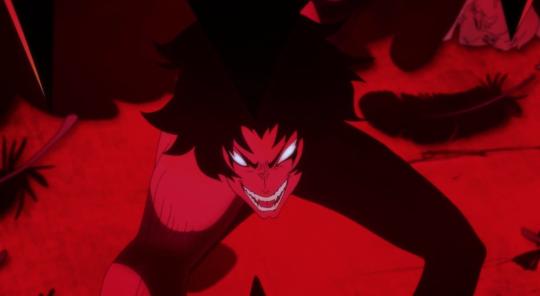
Devilman: Crybaby by Science Saru, a series itself based on one of Evangelion’s chief influences
The new anime boom would also reflect its origins in a number of different ways. More than a few of the new shows to debut in the late 1990s and early 2000s were directly influenced and impacted by Neon Genesis Evangelion, including such notables as RahXephon and Revolutionary Girl Utena. More subtly, the starkly realistic depictions of violence and sexuality in NGE as well as its bizarrely surreal imagery encouraged many directors to try similar techniques, resulting in a shift in style throughout the industry.
Neon Genesis Evangelion’s influence on later anime can be attributed in some ways to its technical sophistication. At its most basic, visceral level, NGE was startling to look at. Even compared with other Gainax works that had come before it, like Nadia: The Secret of Blue Water or Gunbuster, NGE immediately stood out as something unique in an increasingly homogeneous industry. The character designs of Yoshiyuki Sadamoto, strangely subdued yet striking and expressive, helped distinguish the cast while Ikuto Yamashita’s monstrous and biomechanical designs for the Evangelions did the same for the show’s mechs. Combined with the intense direction of Hideaki Anno, Kazuya Tsurumaki, Masayuki, and others NGE drew the eye right from the start.
The technical splendor wasn’t just limited to NGE’s art design or animation either. The voice talents provided by performers like Megumi Ogata, Kotono Mitsuishi, Megumi Hayashibara, and Yuko Miyamura gave life to the characters and helped audiences empathize with them, despite their dysfunctional and emotionally-wrought nature. Also contributing to the audio portion of Neon Genesis Evangelion was Shiro Sagisu, whose music swung significantly from jazzy to melodramatic and even to surreal, changing and evolving to match each scene with an appropriate mood. Assisting Sagisu was the vocal work of artists such as Yoko Takahashi, who made the show’s central theme, “A Cruel Angel’s Thesis,” a pop sensation.
But while the technical triumphs of Neon Genesis Evangelion certainly contributed to the show’s lasting appeal and influence, they’re hardly the whole story. For many viewers, the appeal of Evangelion went well beyond the surface, to narrative and thematic elements they felt spoke directly to them. Indeed, it is arguably NGE’s complex characterization, unorthodox narrative structure, and thematic depth which have made it stand out as one of the most legendary examples of Japanese pop culture.
A Cruel Angel’s Thesis
It’s not an exaggeration to say that essays—and books—have been written about Neon Genesis Evangelion and its thematic qualities. Most of this has been concentrated in Evangelion’s own native Japan, but the sensation has breached the other side of the Pacific as well, resulting in comparisons to the works of David Lynch and other Western directors. Contributing to this no doubt has been Anno’s own numerous references in NGE not only to native Japanese culture but to the West as well, with tributes to works like 2001: A Space Odyssey, The Andromeda Strain, and UFO found frequently throughout.
The most obvious thematic element present in Evangelion, at least to Western eyes, is its frequent allusions to Christianity, Judaism, and Islam. It’s not hard to see why: the monstrous foes besetting humanity are “Angels” who shoot cross-shaped energy bolts, which the main characters fight with “Evangelions” (the Greek word from which “evangelism” derives). Coupled with other bits and pieces here and there referring to original sin, the will of God, and ancient Judaism, these details give Evangelion a strikingly religious appearance to Western viewers.
However, while they’re certainly the most obvious elements in Evangelion, the religious references are also easily some of the most transient and insubstantial. Although initially viewed as central to the plot by many Westerners, it has since been revealed that most of the Biblical references are there for styling rather than substance and were largely intended to make the show stand out. In many respects, the usage of the Abrahamic faiths in Evangelion is similar to the use of Buddhism in The Matrix or Egyptian mythology in Stargate: a bit of fun exoticism to keep things interesting.
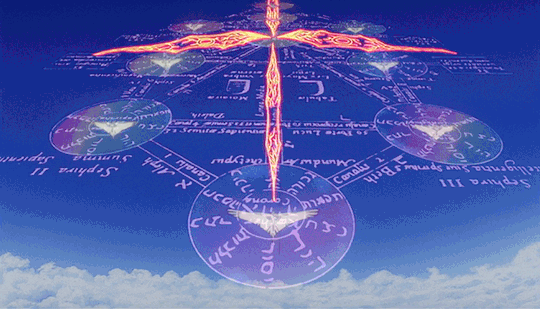
The Sephirot from Kabbalah, as represented in The End of Evangelion
That being said, the religious themes are not as vacuous as is sometimes alleged and the sheer number and obscurity of some of them indicates some real effort on the part of Anno. Each of the Angels, for instance, (which are called shito⁴ in Japanese, meaning “messenger” or “apostle”) are named after actual angels from Abrahamic mythology and their names, when translated from Hebrew or Arabic, often do indicate their nature in some way (e.g., Arael’s name means the “light of God” and it is an enormous winged being who attacks the characters with a beam of light). And while the use of the Kabbalah’s Sephiroth may be perfunctory, many other references to Jewish mysticism appear more meaningful, such as the Chamber of Guf or the duality of the Trees of Life and Wisdom.
Less obvious to Western eyes but possibly even more sophisticated are the references Evangelion makes to non-Abrahamic religions. There is, for example, the notable similarity between what the show terms “Instrumentality” and traditional descriptions of “egoless” nirvana in Buddhism (a religion also referenced by way of the Marduk Institute’s 108 dummy corporations).⁵ Japan’s native religion Shinto also shows its hand, most notably through the depiction of the Evangelions themselves, which Anno consciously designed after the monstrous oni of Japanese legend. All in all, while he may not have intended to portray a particular theological message, it’s clear that Anno put a lot of thought and research into giving Evangelion a suitably mystical appearance.
However, obsessing over the religious imagery in Evangelion obfuscates something far more important: Evangelion isn’t really about religion. Rather, where Evangelion’s thematic depth and complexity most clearly comes into play is psychology and philosophy of the mind.
Neon Genesis Evangelion is often described as a deconstruction of mecha anime. To a large extent that’s true, but it’s deconstruction is specific in outlook, focused on the psychology of its characters in the form of a question: just what kind of people would put the fate of humanity in the hands of adolescent children? And just what would that kind of stress and responsibility do to a child’s mind? In that regard, NGE is in far closer in kinship to Ender’s Game than to its natural predecessors like Macross, Gundam, or Gunbuster.
When the story of Neon Genesis Evangeliom begins, the world has already experienced disaster on an unprecedented scale. 14 years before the show begins, a massive apocalyptic event called the Second Impact devastated the Earth’s climate, precipitated global nuclear war, awakened the monstrous Angels, and resulted in the deaths of half of all humans on the planet. In response, civilization has been restructured and militarized in anticipation of an even worse Third Impact threatened by the Angels. To combat this threat, the secretive organization Nerv assembles biomechanical monsters of their own (the Evangelions) which, as it so happens, can only be piloted by teenagers.⁶
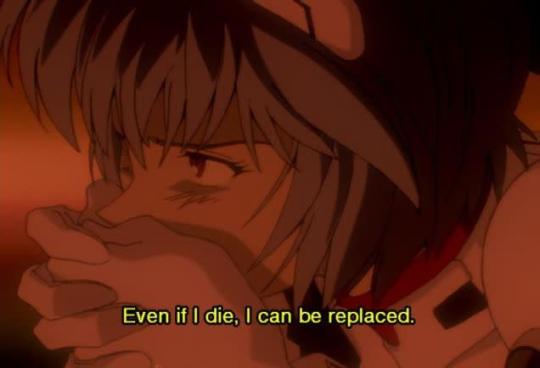
Rei Ayanami, the First Child, believes that her life is expendable
This is the kind of world people like Misato Katsuragi, Gendo Ikari, and Ritsuko Akagi live in and it’s the severity of their situation which ultimately shapes their actions. Although many of the adults, particularly Misato, wish they could let the series’ child protagonists lead a normal life, they know that’s not an option. As a result, the adult characters are driven towards a cold pragmatism that means, no matter how warm or compassionate they may act towards their wards at any given time, they’re still ready to sacrifice them when necessary.
This ruthless approach has its costs, however. The constant pressure to succeed, alongside the emotional whiplash they receive at the hands of the pilots’ supervisors and the repeated trauma they experience in combat results in each pilot’s gradual psychological degradation. Beginning as relatively competent and capable (if slightly dysfunctional) individuals, each pilot eventually succumbs to their trauma and breaks, causing them to isolate themselves from one another and resulting in a breakdown in morale which puts not only themselves but humanity itself at risk.
In keeping with this theme of psychological frailty and the ways in which we as people both intentionally and unintentionally harm those we care about, including those we care about, the series makes numerous allusions to the work of past psychologists and philosophers. Many concepts are mentioned specifically by name, such as the “oral stage,” “separation anxiety,” or the “hedgehog’s dilemma,” while others are alluded to more subtly, such as the Oedipus and Elektra complexes, post-traumatic stress disorder, schizophrenia, or Lacan’s dichotomy of the constructed and ideal selves.
Hideaki Anno has himself said he researched psychology both before and during the production of Neon Genesis Evangelion and that many of the show’s characters are based upon both these concepts and his own experiences. He has, for instance, described the protagonist Shinji as a reflection of his own conscious self, while the emotionally withdrawn Rei is a manifestation of his unconscious, and the enigmatic Kaworu is his Jungian shadow. Altogether, the works of Freud, Lacan, Schopenhauer, Hegel, Jung, and Sartre have all been identified by staff or critics as influences on the show’s characters and plot.
One of the chief psychological themes in Evangelion is abandonment, particularly by those you love or have been cared for by. Throughout the story—in its past, present, and future—each of the main characters is abandoned by people important to them: their parents, their guardians, their lovers, their friends, etc. Invariably, this abandonment leads to a breakdown in identity and self-confidence, as each character is forced to redefine themselves from within after devoting so much of their identity to how they were perceived by others. Thematically matching to this issue of personal abandonment is humanity’s own abandonment by their unknowable creator eons ago, a detail alluded to occasionally as the story progresses. Like the individual characters then, humanity must learn how to manage and master its own fate when it has no one left to depend upon.
The Hedgehog’s Dilemma
These themes, however, would have little resonance were they irrelevant to the show’s human drama. It is to Neon Genesis Evangelion’s credit that they are not; each of the characters represent the show’s themes in both significant and personal ways. It is quite arguable then that it is the show’s protagonists, however controversial they may be either as individuals or an ensemble, which have truly allowed NGE to endure for decades as an icon of Japanese pop culture.
The most important of Neon Genesis Evangelion’s characters by far is easily Shinji Ikari, the pilot of Evangelion Unit-01 and the son of Gendo Ikari, the enigmatic director of the Evangelion program. At the beginning of the series Shinji is called to Nerv by his father, who abandoned him years earlier following the death of Shinji’s mother. Shinji hopes that this sudden call is for the purpose of reunion, but he is quickly disillusioned when his father reveals to him that he needs Shinji to pilot one of the monstrous Evangelions he’s built—a machine Shinji has hitherto never heard of—and to save humanity from extinction. Brokenhearted by his father’s coldness and terrified of the task he’s been blackmailed into performing, Shinji puts off his own desires and self-identity aside for the sake of pleasing his father and others, becoming the so-called Third Child.

Series protagonist Shinji Ikari, the Third Child
Shinji’s a complicated character and one many find difficult to empathize with. He is self-consciously cowardly and phlegmatic, prone to self-criticism, and afraid of getting close to others for fear that they’ll reject him. At times he thinks seriously about running away from his responsibilities, but whenever he actually does he quickly returns, unable to commit to so blatant an act of rebellion for long. Despite this and despite his own reliance on others to define his value, Shinji does have his virtues: he’s thoughtful, easy to get along with, and proves remarkably skilled at piloting, even if he has no real passion for it.
Shinji’s commanding officer, Misato Katsuragi, is NGE’s most prominent adult character and (according to Hideaki Anno) the series’ deuteragonist.⁸ Loud, goofy, and irreverent, Misato strikes quite a different first impression than Shinji, but despite their outward differences they’re actually quite similar people with comparable issues, merely approaching them in different manners. Like Shinji, Misato feels abandoned by her father, who neglected her and her mother before his death years ago. But despite that Misato still yearns for his affection, manifesting her desires in the form of her relationship with Ryoji Kaji, a coworker and lover she admits resembles her father. And, also like Shinji, Misato fears getting close to other people for fear of being hurt, but whereas Shinji manages his anxiety by avoiding people, Misato does so by acting flippant and flirtatious in public, living lightly and maintaining only “surface level relationships.”
Shinji’s move into Misato’s apartment comes largely at her insistence and Shinji is initially quite uncomfortable with it, a feeling which does not subside when he learns she’s an extremely messy housekeeper and an alcoholic. But despite her irreverent personality, Misato turns out to be a deeply caring person who wants very much for Shinji to be happy and, over the course of the series, she tries to direct the development of Shinji as a good parent would, all the while concerned her own flaws make her an unsuitable guardian. Notably, these moments where the two of them bond are some of the most light-hearted in the series.
Although Shinji is the first pilot the series introduces, he is preceded by two others at Nerv. The first, Rei Ayanami, is arguably Neon Genesis Evangelion’s most popular (and certainly influential) character. Enigmatic and asocial to a degree that goes beyond mere awkwardness, Rei lives alone in a desolate apartment she doesn’t even bother to clean, close to no one but her pseudo-guardian Gendo Ikari. Because of her closeness to his father, who has raised her as his own daughter, Shinji initially sees Rei as a replacement for him. It soon becomes apparent however that Rei’s trust and faith in Gendo go well beyond that of a healthy parent-child dynamic. Obedient to a fault and unconcered for her own well-being, Rei causally throws herself into danger for Gendo and Nerv and comes across as emotionless to those around her.
But beneath Rei’s cold, ultra-stoic exterior beats a heart as capable of joy and sorrow as that of any other. Far from the robotic doll many assume her to be, Rei has a secret yearning for others to understand her and her them and, over the course of the series, slowly opens up to Shinji. But although she desires human contact, she doesn’t really know how to initiate it and she’s terrified of the possibility that there’s something about her that makes her fundamentally unlike other people.
Asuka Langley Soryu, the third of the child protagonists to show up,⁷ strikes about as strong a contrast to Rei as one can imagine. Egotistical, loud-mouthed, and possessed of far more bravado than either Shinji or Rei, Asuka joins the cast about a third of the way through the show, after transferring from Nerv’s facility in Germany. Raised since childhood to be a pilot, Asuka prides herself on her skills and looks with disdain on Shinji’s self-deprecating nature and inability to recognize his own accomplishments. Already a college graduate and convinced she’s as much an adult as anyone, Asuka also proves precociously sexual, pining for both Misato’s lover Kaji and, to a lesser but still significant extent, Shinji himself, whom she frequently teases for attention.
Asuka is like Shinji a controversial character; people often look at Asuka and see one of two sides to her: a selfish jerk who bullies Shinji and Rei or an accomplished young woman whose confidence and inner strength makes her the real hero of the show. The truth, however, is that in many ways she’s both. Asuka really is brave—far braver than Shinji or even Rei, who doesn’t really fear death—and she’s definitely skilled. But she’s also prone to jealousy and vindictiveness, as well as a consciously manifested attitude of not caring for anyone. In many ways, however, her bravado is a cover for own insecurity, built upon the belief that no one really likes or loves her.
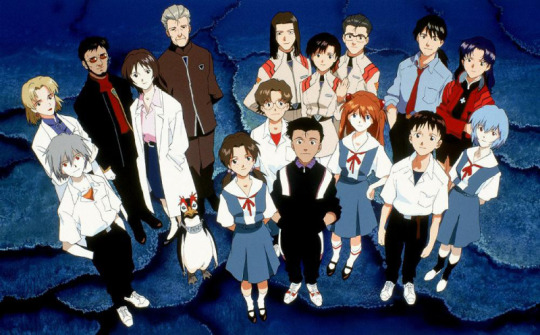
The cast of the original Neon Genesis Evangelion
There’s a lot to admire about NGE’s characters, even with all their flaws and personality disorders. It’s easily got one of the most complex and diverse casts in anime and there has to be something said for the fact that of its four principal characters, three are female, allowing it to easily pass the Bechdel-Wallace Test (which it does). The characters each have their own virtues, which in a more easygoing series could make them quite endearing. Lead protagonist Shinji’s selfless and has a fairly noble streak, though it’s hidden deep beneath his own self-doubt and loathing. The adult Misato’s fairly protective of her young charges, at least insofar as she is allowed to be given the circumstances, and is also quite a bit more capable than many expect. Selfless Rei’s loyalty and discipline easily make her one of the most sympathetic characters in the series, even if she does sometimes come across as alien or inhuman. And there’s little question that the daring Asuka has enough chutzpah for the whole cast.
But it could also be argued that the complexity and harshness of NGE’s characters which ultimately make them work, even if at times they also make the show hard to watch. Shinji, Misato, Rei, and Asuka are not the idealized paragons of humanity you’d expect to find in most television shows aimed at teenagers, but they’re not the imaginings of a bitter misanthrope either. They’re deeply flawed, yes, and when they’re hurt they keep on hurting, but they also keep going and keep trying to find a way to live with others that doesn’t result in pain. It’s this idea, the recognition that people screw up and hurt one another but want to do better, that really enlivens the franchise. For all the reputed darkness of Evangelion’s story, it is in many ways idealistic, always hopeful that it’s characters might find a way to be happy. You don’t have to be broken, it says, even if you are damaged.
And it is that core ethos of qualified hope that elevates Neon Genesis Evangelion from just another mecha anime or even a deconstruction of mecha to something more. Something sublime and, in its own strange way, even inspirational.
The Sickness unto Death
At this point I feel it’s useful to provide some personal background. I first watched Neon Genesis Evangelion when I was in high school, sometime between my third and fourth years. My initial reaction was, I think, largely typical. The first episodes interested me and as the storyline moved forward and became more complex, I became more invested in the show’s events and characters. I even appreciated to some extent the bizarre and abstract final two episodes, though I’d hoped for a more conventional ending. Then, I watched The End of Evangelion, whoch left me shocked and dismayed at its harshness. I still cared about the series, but I felt more ambivalent as a result.
Over the next few years I continued to keep up with the Evangelion fandom to a small extent, checking out the rumors about the new movies and reading some fan fiction online, but I gradually drifted away. None of the fan speculation or fiction really seemed to scratch the same itch the original series had and eventually my interests in anime shifted more towards Ghost in the Shell: Stand Alone Complex and Fullmetal Alchemist. Evangelion, as much as I’d enjoyed it before, fell gradually into the background of my life.
And then I entered college.
In my youth, I was generally regarded as a “bright” student, fawned over by teachers and regarded by my peers as either a genius or a “know-it-all,” depending on how much they liked me (or didn’t). As I entered the final years of high school it was clear that I was expected to excel in university. But when I actually began my college career I quickly faltered. Depressed, socially isolated, and exhausted from getting four to six hours of sleep a night, my grades slipped quickly and my social life evaporated. For awhile, I tried to deny my problems and ignore them, believing I could power through without help. Eventually, though, I had no choice but to confront my issues: I was put on academic suspension and my financial assistance was pulled.
I was devastated. I had no idea what to do. I didn’t know how to tell my parents, who I’d let believe I was doing fine. I didn’t know where to go with my life now that I’d failed to live up to the expectations I’d allowed other people to put on me. I didn’t even really know who I was anymore. If I wasn’t a brilliant student and child genius, who was I? In my own eyes I was worthless and contemptible.
Eventually, with the help of my family and friends, as well as staff from the university, I was able to make my way back to daylight. I began to undertake counseling. I went to community college to bring my GPA back up. I started talking more openly with my loved ones about my problems, even though I was worried it would make them think less of me. And I began to be more honest about my flaws and limitations.
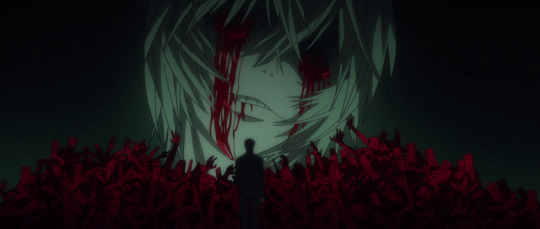
A scene from Evangelion 3.0: You Can (Not) Redo, the third Rebuild film
It was also around this time, rather coincidentally, that I began to seriously revisit Evangelion. I was prompted, as much as by anything else, by the release of the new “Rebuild of Evangelion” films. After my brothers and I attended a screening of the second film’s release in early 2011 with several of our friends, the latter (hitherto unfamiliar with Evangelion) expressed interest in catching up with the franchise. Indulging them, my brothers and I rewatched the original TV series. To my surprise, I began to see the series in a new light. Where once I had simply been sympathetic to Shinji, Misato, Rei, and Asuka’s inner turmoil, now I felt deeply empathetic. Where previously the show’s harshness had at times alienated me, now it felt deeply relatable and truthful. And where earlier the TV show’s decision to focus on the internal psyches of its main characters instead of the plot had puzzled me before, now I felt as if I understood it completely. I even began to appreciate the theatrical finale, a film so brutal some regard it (falsely) as Anno’s revenge against fans angry with him for the original ending.
What had changed? Certainly not the show. Rather, it was my perspective. I possessed now of a viewpoint I hadn’t held earlier. I knew now what it was like to be full of contempt for one’s self, to be a defeated shell of a person who felt as though their value was slipping away or was already entirely absent. I knew what it was like to believe I was a failure in every meaningful way. In other words, I’d gained the perspective of a person suffering from depression. The same perspective as that of Evangelion’s principal characters as well as their creator, Hideaki Anno.
It’s hardly secret knowledge that Hideaki Anno was suffering from depression when he first created Neon Genesis Evangelion. The extent of his depression, however, was far graver than is generally recognized. When Anno began work on the project that would become NGE, he had already been suffering from severe depression for at least four years. In a statement released with the first volume of Evangelion’s manga (comic) adaptation Anno described himself as “a broken man... who ran away for four years, one who was simply not dead.” And while the production of NGE had originally been intended to break him out of a rut, the stress only compounded the severity of his condition. By the time of the show’s completion Anno was, by his own later admission, borderline suicidal.
No one’s ever said precisely what drove Anno over the edge publicly, but it’s widely agreed it had much to do with the production of his previous work, Nadia: The Secret of Blue Water. Originally conceived by Anno’s mentor Hayao Miyazaki in the mid-1980s Nadia was eventually handed off to Anno after Gainax made a bid for the project. Far gentler and family-friendly than NGE, the comparative sweetness of Nadia obscured a troubled production that saw animation work outsourced and Anno frequently butting heads with NHK, the series’ broadcaster, over the show’s content and creative direction. Coupled with rumored trouble in Anno’s personal life, the experience proved too much for him, driving him into the deep depression that would haunt him for most of the 1990s.
The roots of Anno’s emotional troubles may go deeper, however. Long regarded by those close to him as a lonely and eccentric oddball, Anno was socially withdrawn as a child, preferring to spend his time watching and recreating scenes from his favorite anime and tokusatsu to interacting with others, a choice he’d later say he regretted. In 1983, due in large part to his social isolation and inactivity at school, he dropped out of university and lived homeless for a time before he was discovered by Miyazaki and employed as an animator for Nausicaä of the Valley of the Wind. The experience proved vital to his career and soon afterward he and a few friends gathered to form Gainax, their own animation studio. It was during this time that Anno directed Gunbuster alongside working on other projects such as Royal Space Force: The Wings of Honnêamise and Grave of the Fireflies. For a time, he seemed happy. But then came Nadia and he withdrew entirely from his work and social life, before reemerging to work on Evangelion.
Anno’s turbulent life and emotional turmoil is reflected in the characters of Evangelion, many of whom enter the story damaged but apparently functional only to completely fall apart later on. Shinji is lonely and dependent when he first appears, but he still manages to form friendships and do what’s required of him. Misato may be an alcoholic with a mess of a home, but Nerv’s trust in her is rewarded time and time again by her effectual planning and coordination of her pilots. Rei’s cold and emotionally withdrawn, but her dutiful selflessness both inspires and attracts others to her. Asuka can be arrogant and reckless, but she’s also intelligent and capable of real kindness towards those she respects. Like Anno in the early days of Gainax, they all seem to be on top of things.
But just when it seems like the team’s getting the hang of things and finding their groove, disaster strikes. Soon, as one crisis mounts on top of another, from near-death experiences to being forced to hurt his friends, everything falls apart. Shinji’s newfound self-confidence shatters and he becomes even more needy than before. Misato’s constructed domestic bliss blows apart just as her own convictions are thrown into question by new revelations about her work. Rei becomes colder and more distant than ever before, withdrawing even from Gendo, the one person she trusts implicitly. And Asuka collapses into a pit of self-loathing despair, savagely lashing out at anyone who gets close to her. It’s ugly, it’s nasty, and it’s real.
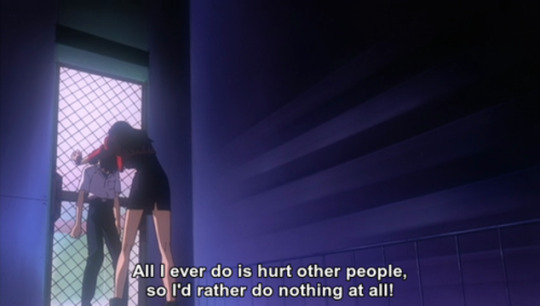
Shinji admits to his feelings of worthlessness to Misato Katsuragi, his guardian and confidante, in The End of Evangelion
This cycle of crash, despair, and recovery is not unusual for suffers of depression. Contrary to what is often thought, depression is not really something you have at one point in your life and then “get over;” it’s something that can shadow you your entire life, kept in check by momentary pleasures and good times but always threatening to surge and overwhelm you when things go awry, sending you into a spiral of self-hate and abnegation that can last for weeks, months, or even years. Friends and family help keep it in check, as does therapy and pharmaceuticals, but it never goes away completely. The only thing you can do is recognize the symptoms and do your best to confront them. You have to keep going. You can’t let your fears drive you to abandon the world. You must not, in other words, run away.
And really that’s what the characters’ struggles in Evangelion come down to: facing reality and acknowledging their flaws while also recognizing their own potential to overcome them and the painful struggle for acceptance we all, on some level, endure. The first instinct of every character in the series is to run away from their problems, to obscure them with outwardly derived duties, relationships, or purposes. Shinji and Rei both look to Gendo, Misato to her job, and Asuka to her pride as an Eva pilot, but all of them are running away and, as a consequence, are unprepared to deal with reality when it hits them flat in the face.
Or are they?
As Long As You Try to Continue to Live
It’s worth noting that when Anno created Neon Genesis Evangelion he didn’t initially set out to create a dark and cynical deconstruction of mecha anime. When asked what initially gave him the impetus to create NGE, Anno has said repeatedly that he originally meant to make a show more in the spirit of Gundam or Space Battleship Yamato, two of his favorite TV shows from his youth, but without the shackles inherent to sponsorship by a toy company, as was common practice for anime at the time. “I made Evangelion to make me happy and to make anime lovers happy,” he said in a 1996 interview, “in trying to bring together the broadest audience possible.”
But as pre-production on the series progressed (and his emotional state regressed) Anno became further disenchanted at the state of anime, concerned that fans were turning to it as a way to escape reality as he himself felt compelled to. “I wonder if a person over the age of twenty who likes robot anime is really happy,” he stated in an article for Newtype half a year before the series aired. This change in perspective, coupled with his resurgent depression, caused Anno to shift focus as he became more and more concerned with the characters’ emotional development, hoping that by the end of the series’ narrative “the heroes would change,” breaking away from their regressed emotional state and achieving the same emotional well-being and self-dependence Anno still sought for himself and which he felt his audience needed as well.
It’s this perspective of Anno’s—that anime otaku were and are caught in a kind of prolonged childhood—which has led to the impression that Anno hates otaku and believes their lives to be worthless. But the truth is that Anno’s thoughts on the subject are quite a bit subtler and more reflective than many give him credit for. Far from hating otaku, Anno counts himself among them and feels defensive whenever they’re derided by others. The issue, he thinks, is less that otaku are permanently stunted and more that they’re afraid or reluctant to open themselves to new experiences:
“I feel that otaku have already become common to all countries. In Europe, in Korea, in Taiwan, in Hong Kong, in America, otaku really do not change. I think that this is amazing. I say critical things towards otaku, but I don’t reject them. I only say that we should take a step back and be self-conscious about these things. I think it’s perfectly fine so long as you act with an awareness of what you are doing, self-conscious and cognizant of the current situation. I’m just not sure it’s a good thing to reach the point where you cut yourself off from society. I don’t understand the greatness of society, either. So I have no intention of going so far as to call for people to give up otaku-like things and become more suited to society. Only, I think there are many other interesting things in the world, and we don’t have to reject them.”
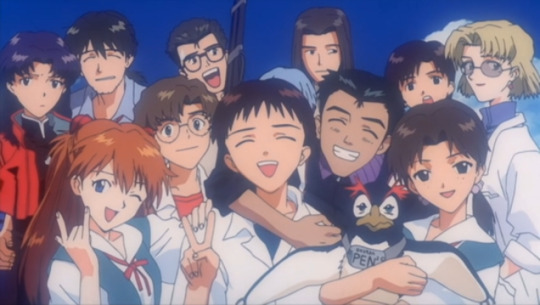
Despite everything, the characters still care for and want to see one another happy
And that’s what I mean by Evangelion’s subtle, qualified idealism. Despite Anno’s frequent cynicism and troubled state of mind during the production of the series, it’s clear that at heart he’s a person who believes people can change and improve themselves. He’s someone who believes that, even in the worst or most desperate of situations, people can find happiness if they’re open to it. “As long as you try to continue to live,” one character states in The End of Evangelion, “any place can be a heaven… there’s a chance to become happy everywhere.”
It would certainly be easy to define the characters of Evangelion by their failures and—given the magnitude of their failures��it’s understandable why many do. After all, much of the series’ narrative is caught up (as I noted earlier) in deconstructing the kind of scenario typical of mecha shows and examing what really would happen if teenagers were put in charge of the world’s salvation. As such, as in other deconstructionist narratives (such as the Battlestar Galactica reboot or Watchmen), the characters screw up about at least as often as they succeed.
That being said, more often than not, when the characters are hit with tragedy or trauma, they eventually recover and bounce back. They’re definitely damaged and shaken by their experiences, but they keep on going anyway. As much as Shinji fears and abhors piloting he’s also someone who, when people are really depending on him, will almost always get right back in the cockpit and try to help. Rei may be over-compliant and lack any regard for herself, but she’s also capable of defying orders when she knows they’re wrong. And for all Asuka’s jealousy and grandstanding, she’s also a person deeply capable of love and self-sacrifice, who would die for those she cares about.
This ray of hope at the core of Evangelion’s story is made most clear in the television series’ original broadcast ending, wherein Shinji rediscovers his own self-value and the joy of living in a world with other people and declares that, although he hates himself, “maybe, maybe I could love myself. Maybe, my life can have a greater value.” But such idealism is even found in the much more outwardly harsh vision of The End of Evangelion. After coming face to face with the world he thought he desired—a world without pain or individuality—Shinji realizes that it’s also a world without happiness. “This isn’t right,” he says. “There was nothing good in the place I ran to, either. After all, I didn’t exist there... which is the same as no one existing.” Realizing this, Shinji chooses to return to the physical world he knew, even if it means feeling pain again.
The idea that joy and pain are in many ways coterminous with one another is hardly original to Evangelion; indeed, it’s a fairly important concept to Buddhism. But I’ve rarely seen the idea expressed in quite the same way as Evangelion, in a way that’s both fully formed and strangely life-affirming. Pain is inevitable, but so is joy. You’ll be hurt, but it’s better than never feeling anything at all and may only give you more appreciation for what you have. You may feel alone, but you’re not; everyone suffers in their life at one point or another, and you don’t have to carry that burden by yourself.
Reflecting upon and considering these themes through Evangelion, as I rediscovered it during a low point in my life, allowed me to appreciate it in a way I’d never been able to before. And it also helped me to move on with my life, to accept the losses I could never recover while also believing it didn’t mean my own life was over. Like Shinji, Misato, Rei, and Asuka, I didn’t have to be defeated by my experiences. I could keep on going. I didn’t have to run away. And that’s a message I believe everyone needs to hear at least once in their life.
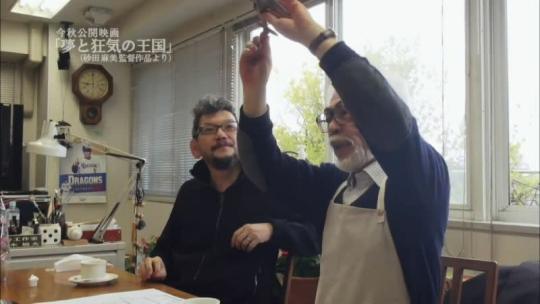
Series creator Hideaki Anno (left) with mentor Hayao Miyazaki (right)
Today, Hideaki Anno has found some peace of mind. He’s happily married, the head of his own production company, and he’s physically healthier too. He still suffers from depression—he’s not cured by any means and he probably never will be; depression isn’t that kind of disease. But he’s able to fight it now and to find the happiness he once believed illusory. He has the same hope he wanted his characters to find in Evangelion. And which I also feel I’ve found, in some small part, thanks to him.
¹Throughout this essay, Neon Genesis Evangelion or NGE refers to the original TV series, The End of Evangelion refers to its theatrical sequel, Rebuild of Evangelion refers to the series of rebooted films produced decades later, and Evangelion on its own refers to the franchise as a whole.
²Specifically, shōnen, meaning boys aged between 12 and 18.
³The term has since been adopted by Western anime fans, but in Japan the word does not necessarily refer to animation fans specifically but to anyone with an obsessive interest in something.
⁴Ironically, “messenger” is a literal translation of the word angelos from Greek—the origin of the English word “angel”—as well as the original Hebrew mal’akh.
⁵The numbers 8 and 108 are both significant in Buddhism. 8 refers to the Noble Eighfold Path to enlightenment. 108 refers to several things, including the number of beads in a Vajrayana prayer rosary, the number of questions asked of the Gautama Buddha in the Lankavatara Sutra, or the number of times Japanese Buddhist temples ring a bell on New Year’s.
⁶The reason for this is never fully explained. Behind the scenes, this was largely because of the show’s target demographic. In universe though it may be related to the secret nature of the Evangelions themselves, which have human souls.
⁷Deuteragonist is a term which means the second-most important character with whom the audience’s sympathies are intended to lie.
⁸Though referred to as the Second Child(ren) because she was the second candidate approved to pilot Evangelions, before Shinji but after Rei.
44 notes
·
View notes
Text
100+ Pagan or Witch names and their meanings
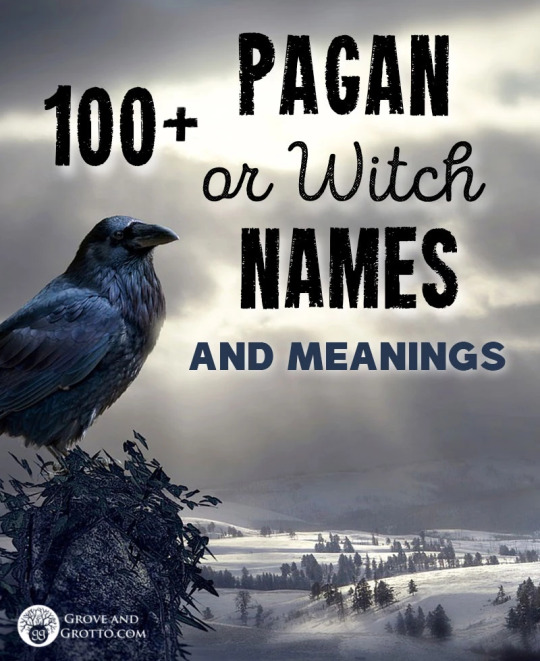
Posted by Michelle Gruben on Apr 11, 2019
Looking for the perfect Pagan or witch name? Check out our list of over 100 magickal names drawn from the realms of the occult. Whether it’s for yourself, an animal familiar, or a fictional character, have fun perusing these delightfully witchy monikers.
Christian names have usually honoured Biblical figures and saints, but Pagans prefer to name themselves after nature, folklore, and the gods of antiquity. Many names are drawn from ancient stories and are charged with mythic power. Some of the names on this list didn’t start out magickal, but got that way in modern times through association with famous witches. (This is admittedly a Eurocentric list, since my own background is in classical literature and Western magick. If you are the bearer of a witchy name from another tradition, I’d love to learn about it!)
Many witch names are unisex and others can be adapted to any gender. Creating compound names are one way that Pagans pay homage to sacred objects, spirits, and concepts (e.g., Raven Moonflower or Amethyst Dragonfyre). Try mixing and matching these first names with your favourite nouns and adjectives to create your very own Craft name.
Adelinda - A Germanic name meaning "noble serpent." A variation is Delinda.
Aine – “Radiance.” Queen of the fairies in Celtic lore.
Airlia – “Ethereal.”
Aislinn – “Dream or vision.” Irish female name.
Alcina – A Greek sorceress. Title character of an opera by Handel.
Alita – “Winged one.”
Althea – “Healer.”
Alvin/Alvina – “Elf.” Many "Al-" names related to elfkind, including Alfred/Alfreda ("elf counsel") and Albert ("bright elf" or "elf ruler").
Ambrosia/Ambrosius – “Food of the gods.”
Amethyst - Lovely purple stone, known to the ancients for bringing sobriety, wisdom, and protection, especially to travelers.
Angela - “Divine messenger.”
Aoelus – “Wind.”
Aradia – Legendary Italian Witch, one of the principal figures in Charles Godfrey Leland's 1899 work Aradia, or the Gospel of the Witches.
Ariadne – “Most holy.” Mythical figure associated with mazes and labyrinths.
Ariel – A Biblical name meaning “Lion of God.” In Disney, a little mermaid. In Shakespeare, a shape-shifting spirit who aids the wizard Prospero. Also the name of the famous poem cycle by Sylvia Plath.
Artemis – Greek virgin goddess of the moon and wild animals.
Arwen – An elven princess in Tolkien’s Lord of the Rings. Arwen is derived from Welsh and means “fine” or “fair.” A masculine form is Arwyn.
Asteria – “Star-like.” Variations include Aster, Astrid, and Astra.
Aura – “Wind,” in Greek. In metaphysics, the word refers to the energy field surrounding the body.
Avalon – Legendary final resting place of King Arthur. Also the setting of a series of fantasy novels by Marion Zimmer Bradley.
Awen – “Inspiration.” Symbol of the well of creativity and of the bardic arts.
Bran – Means “Raven” in several Celtic languages. A great historical name with connections to Welsh mythology and Arthurian legend.
Breena – “Faery place.” Variations: Brinna or Briana.
Brigid – Celtic goddess of the forge, healing, and poetry. Beloved in Ireland and around the world, variations of her name include Bridget, Brighid, and Bride.
Calypso – “Hidden.” A nymph who detained Odysseus for many years.
Cassandra – Ill-fated soothsayer of Troy. Cassandra incurred the displeasure of Apollo, who cursed her so that her prophecies would never be believed.
Cedar – An ancient tree associated with wisdom and protection.
Celeste – “Heavenly.”
Cerridwen – “Fair as the poem.” May also derive from the Celtic word for “cauldron.” A powerful enchantress of Welsh legend, identified with the Wiccan mother goddess.
Charon – As the boatman on the River Styx, Charon ferries souls across to the Underworld. The modern Greek equivalent is Haros.
Chimera – “Dream, phantasm.”
Circe – Greek demi-goddess or witch renowned for her knowledge of herbs and potions.
Corvus – Latin for “raven” or “crow.” A literate alternative to becoming yet another Raven.
Crystal – A name that became popular in the 1980s and 90s. (Witches love crystals!)
Delphine – “Woman from Delphi.” The Delphic oracles were priestesses of Apollo.
Devin – “Musical poet.” A Gaelic boy’s name, now unisex.
Diana – Roman name for the moon goddess, known in European lore as the “Queen of the Witches.”
Draco – “Dragon.” One famous bearer is Draco Malfoy of the Harry Potter series.
Eartha – “Earthly.” From Old English.
Endora – The magical mother-in-law in the TV sitcom Bewitched. Her name comes from the Biblical Witch of Endor who counseled King Saul.
Eris – Greek goddess of Chaos. Patron goddess of the Discordian magickal tradition.
Erzulie – A spirit (or family of spirits) in Vodou. She has many forms and rules over love, beauty, health, and sexual passion.
Fabula – “Legend.”
Faye – “Fairy.” From Old English/Old French. Also Fay, Fae, Faeryn, Fayette.
Fiamma - "Flame." This Italian word carries the same connotations as "flame" in English, meaning either a (literal) fire or a (figurative) lover.
Foster – “Forest guardian.” From Old English.
Freya – “Noble lady.” One of the most revered of the Norse deities.
Gaia – The personification of Earth, and one of the Greek primordial gods.
Glinda – “Fair” or “good.” The Good Witch of the South in the Oz novels of L. Frank Baum.
Gwydion – Master magician and trickster of Welsh lore. His name means “born of trees.” Famous bearers include the American witch and bard Gwydion Pendderwen (1946–1982).
Hazel – “Hazel tree.” Hazel branches are the traditional material for divining rods.
Hecate – Crossroads-dwelling goddess of witchcraft. Her name may mean either “power” or “far-reaching.” The Greek spelling is Hekate.
Hermione – “Messenger.” A female name derived from Hermes. Popularized as a Witch name by the Harry Potter series, but also appropriate for a Hermetic magician.
Herne – “Horned.” The lord of wild things, identified with the Pagan Horned God.
Holly - This cheery girl's name is shared with one of the sacred trees of Celtic lore. A male or family name version is Hollis.
Isis - Mighty Egyptian goddess of magick and healing.
Jasmine – A delicate and aromatic flower known for its mystical and aphrodisiac properties. The name is Arabic in origin.
Jinx – “Trick” or “curse.”
Lamia – The Lamia is a child-devouring serpent or monster in Greek mythology. She was once a Libyan queen, but was cursed by Hera for her trysts with Zeus.
Larissa – A Greek sea nymph, also the name of an ancient city in Thessaly.
Leo – “Lion.” Also a sign of the zodiac.
Ligeia – “Shrill” or “whistling.” The name of one the Greek sirens, revived by Edgar Allan Poe in his short story by the same title.
Lilith – Adam’s first wife, according to Hebrew mythology. Lilith is associated with various night demons and flying goddesses.
Lorelei – Freshwater mermaid of the Rhine River. The Lorelei is a temptress who delights in the destruction of fishermen.
Lucia – A Latin name meaning “light”. The masculine form is Lucius.
Lucifer – A provocative name associated with the Christian devil. Lucifer means “light-bringer.”
Luna – “Moon.” Luna Lovegood is a minor character in the Harry Potter series.
Maeve – “Intoxicating.” An Irish warrior queen. Also related to Queen Mab, faery ruler of British folklore. Variations include Mab, Meave, Maeven.
Marisol – Beautiful Spanish name meaning “sea and sun.”
Medea – A Greek witch, the subject of a play by Euripides and a later opera. Medea was of divine descent and used sorcery to defeat her foes.
Melusine – A water spirit from French medieval folklore. Also written as Melusina.
Merlin – Legendary sorcerer of Old Britain.
Minerva - Roman name for the goddess of wisdom. A well-known bearer is Minerva McGonagall, the headmistress of Hogwarts in the Harry Potter series.
Miranda – “A marvel.” This name first appeared in Shakespeare’s The Tempest.
Morgan – Morgan le Fay is a (usually) adversarial figure in the Arthurian legends. Variations include Morgaine or Morgana. A similar-sounding name belongs to Celtic warrior goddess Morrighan.
Morpheus – “Shaper.” Greek god of sleep and dreams.
Nerissa – “Of the sea.” From Shakespeare.
Neve – “Bright.” An Anglicized version of the Irish name Niamh.
Nissa – A Scandinavian name for a brownie, sprite, or friendly elf.
Oberon – “Elf ruler.” A Faery king in Shakespeare’s A Midsummer Night’s Dream. Famous bearers include Oberon Zell (b. 1942).
Ondine – “Mermaid or “Water spirit.”
Orion – A prominent constellation named for the hunter from Greek mythology. One notable Orion is author Orion Foxwood.
Pagan – “Country-dweller.” The most straightforward Pagan name there is.
Petra – “Stone.”
Peregrine – “Traveler, foreigner, pilgrim.”
Phoenix – Mythical bird that would incinerate itself every 500 years (by most accounts), then rise from the ashes.
Puck – A mischievous forest spirit in A Midsummer Night’s Dream. Origin of the adjective “puckish.”
Pythia – One of the traditional titles of the Oracle of Delphi. The Pythia was originally a serpent monster defeated by Apollo.
Raven – One of the most widely-used Pagan/witch names, in various spellings and combinations. Ravens are associated with death, cunning, and secret knowledge.
Rhiannon – Welsh goddess associated with horses. Made popular as a witchy name by the Fleetwood Mac song “Rhiannon.”
Rosemary – “Dew of the sea.” The name refers to the small blue flowers that appear on Rosemary bushes.
Rowan – “Red-haired.” A unisex Celtic name shared with the mystical Rowan tree.
Rowena – A Germanic name, possible derived from the words for “fame” and “joy.” Another name revitalized by the Harry Potter series.
Sabrina – Latin place-name meaning “from Cyprus” or “from the river Severne.” Teenage witch of comics and television.
Sage – “Wise redeemer.” Also a widely-used herb in witchcraft.
Salem – Historic Massachusetts city known for its 17th-century witchcraft trials. The feline familiar of Sabrina the Teenage Witch.
Samantha – In Hebrew it means something like, “God heard” or “told by God.” In Greek, it may mean “flower.” Samantha owes its witchy cred to Samantha Stevens, the protagonist of the TV sitcom Bewitched.
Sedona – A town in Arizon famed for its energy vortexes, now a thriving New Age community. This pretty name has no known meaning and was probably invented by an early settler in the area.
Selene – Greek goddess of the moon. A variation is Selena, and belongs to Pagan elder Selena Fox.
Shadow – A spirit, ghost, or illusion.
Shasta – An active volcano in California, renowned as a spiritual pilgrimage site.
Shayla – “From the faery place.” Many spellings and variations.
Silver - A magickal metal, sacred to the Moon. Famous bearers include author Silver Ravenwolf.
Sirena – “Mermaid.”
Sirius – “Glowing, burning.” Also known as the Dog Star, Sirius is the brightest star in Earth’s night sky.
Sophia – “Wisdom.”
Stella - "Star." Variations include Estelle and Estrella.
Strega – “Witch” in Italian.
Sybil – “Prophetess” or “Divine counsel.” This name, from ancient Greek, also belonged to the famous English witch Sybil Leek (1917-1982).
Sylvia – “Of the forest.”
Tanith – Phoenician moon goddess whose name means "serpent lady." Famous Taniths include science fiction and fantasy writer Tanith Lee (1947 – 2015).
Tara – In Irish, a rocky hill. In Sanskrit, a star.
Thurston – “Thor’s stone.”
Titania – “Great one.” The queen of the fairies in Shakespeare’s A Midsummer Night’s Dream. Variations include Tatiana and Tanya.
Umbra – “Shadow, ghost.”
Urania – “Heavenly" or "daughter of the Sky.” An epithet of Aphrodite and Isis.
Vera – “Truth”
Vernon – “Alder tree.”
Vesta – Roman hearth goddess. Priestesses of Vesta tended the sacred flame in her temples.
Willow – “Willow tree.” Willow is a popular witch character in the TV series Buffy the Vampire Slayer.
Zephyr – “West wind.”
https://www.groveandgrotto.com/blogs/articles/100-pagan-or-witch-names-and-their-meanings
7 notes
·
View notes